
NAVIGATING 2025 NEW RESORTS IN 2025 KEY TRENDS FOR MALDIVES’ TOURISM INDUSTRY
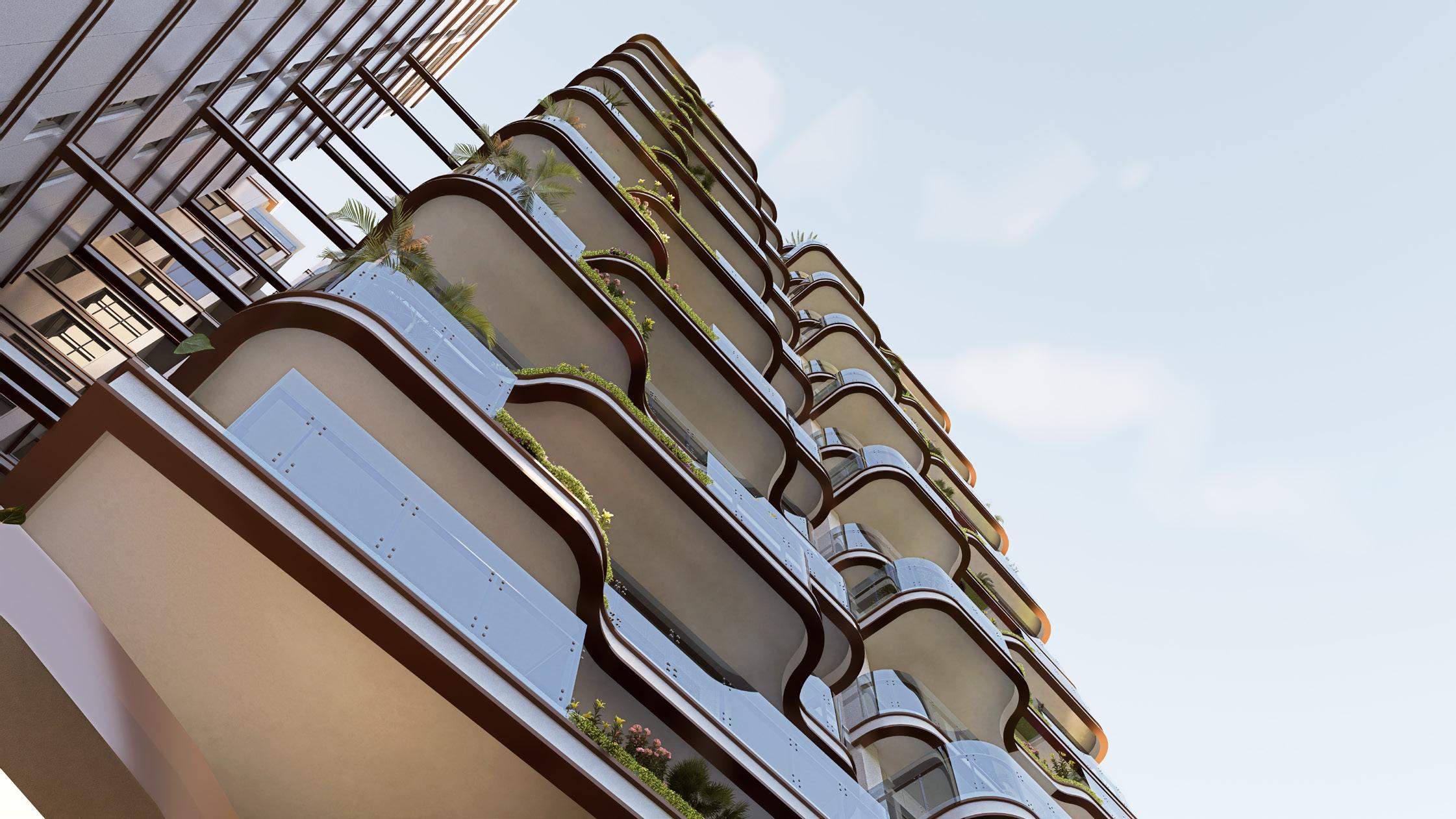



NAVIGATING 2025 NEW RESORTS IN 2025 KEY TRENDS FOR MALDIVES’ TOURISM INDUSTRY


Run your IT operations at Ooredoo Tier III ready Industry grade Data Center Facility
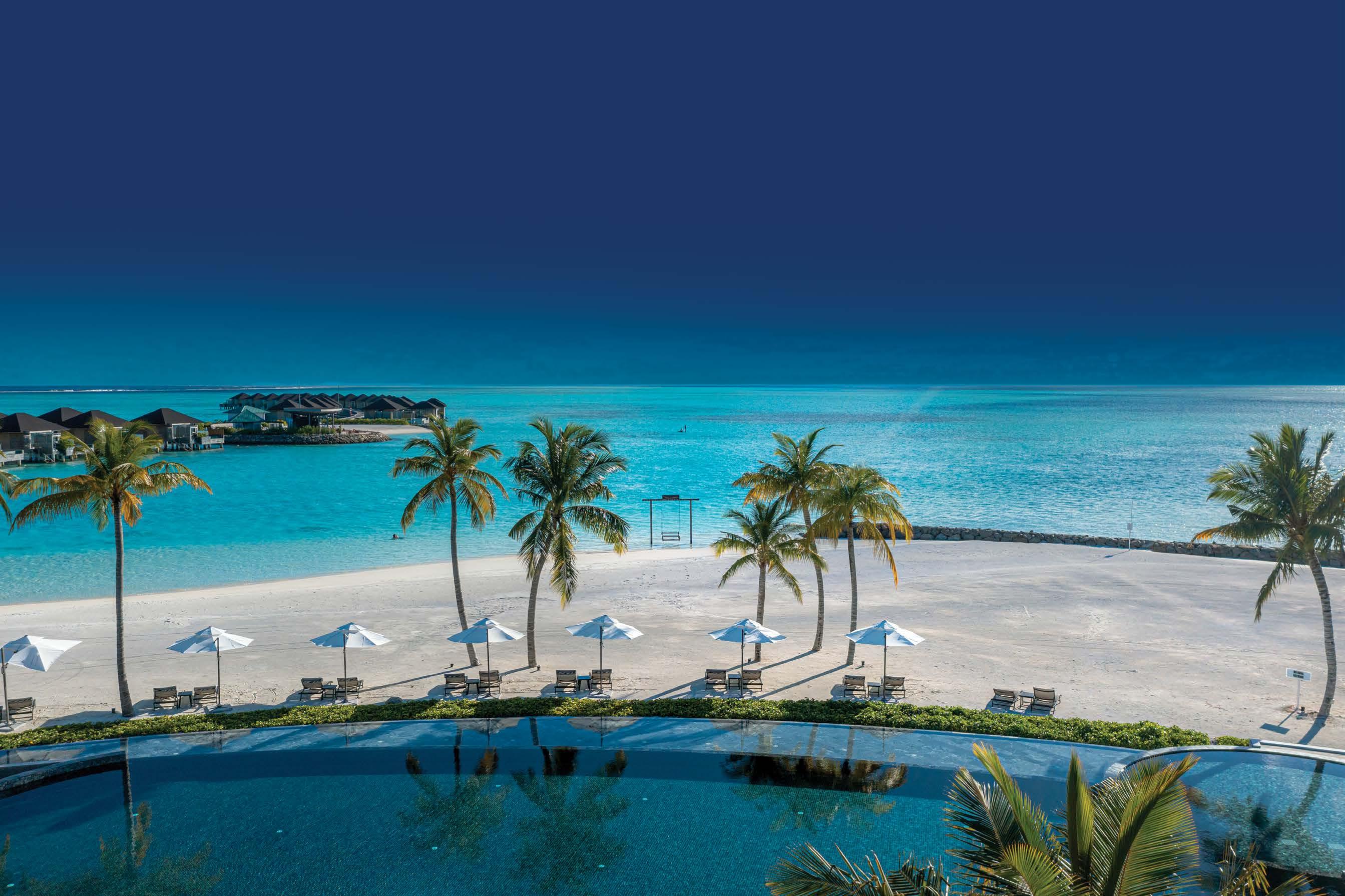

HOTELIER MALDIVES
Volume 15, Issue No: 68
EDITORIAL
Ismail Faseeh, Editorial Director
Ali Naafiz, Editor naafiz@hoteliermaldives.com
Ibrahim Mahudhee, Managing Editor mahudhee@hoteliermaldives.com
CONTRIBUTING WRITERS
Thoiba Riyaz, Maha Rasheed, Moobeen Jaleel, Maaish Mohamed and Mariyam Saaliya Mohamed
LAYOUT DESIGN
PHOTOGRAPHY
Courtesy of the respective resorts
SALES
Naail Nihaadh naail@hoteliermaldives.com sales@hoteliermadlives.com
PUBLISHER
Perspective Pvt. Ltd. 4th Floor, M. Kaneeru Villa, Orchid Magu, Male’, Republic of Maldives, PO Box No. 20212 +960 7246292, +960 7910858
Dear readers,
As we step into 2025, the Maldives tourism industry is poised at a crucial juncture. This issue of Hotelier Maldives delves into the many facets shaping the destination’s evolving narrative—from culinary creativity to the transformative power of private investment.
The main feature, Navigating 2025: Key trends for Maldives’ tourism industry, offers insights into emerging developments, highlighting the importance of sustainability, technology, and experiential travel in maintaining our competitive edge. Amid economic challenges, including new currency exchange regulations, the industry’s resilience is a testament to its adaptability.
Our cover stories exemplify this adaptability. Chef Daniel Patrick Navarro Agustin’s culinary journey at Grand Park Kodhipparu and Chef Pradeep Pathirana’s leadership at Ayada Maldives underline the dynamic culinary arts defining luxury hospitality. On a similar note, profiles of innovators like Malsa Shiyam at The Ritz-Carlton Maldives and Ni Wayan Priyanka Diana at Grand Park Kodhipparu celebrate individuals driving change from within.
While we reflect on milestones like VARU by Atmosphere’s five years of authentic Maldivian luxury and Kandima Maldives’ launch of an oceanfront go-kart track, we also explore new beginnings. The anticipated openings of new resorts in 2025 hint at bold directions for the market.
This year also brings conversations about the untapped potential of uninhabited islands, where private investments could redefine the Maldives’ economic landscape. As we balance growth with sustainability, the need for innovative approaches and partnerships has never been more apparent.
Through these stories and more, Hotelier Maldives celebrates the spirit of our industry: one that thrives on reinvention while honoring tradition through our Hotelier Maldives Awards 2025, presented by BestBuy Maldives (BBM). Let us welcome 2025 with a shared commitment to excellence, innovation, and the enduring allure of the Maldives.
Here’s to a remarkable year ahead for Maldives tourism.
Ali Naafiz Editor
Daniel Patrick Navarro Agustin’s culinary journey at Grand Park Kodhipparu Maldives
Heritance Aarah Maldives: Seamless blend of luxury, relaxation, adventure
Discover a divers’ paradise at Cinnamon Dhonveli Maldives
From Intern to Innovator: Malsa Shiyam at The Ritz-Carlton Maldives, Fari Islands

Navigating 2025: Key trends for Maldives’ tourism industry
Ayada Maldives: Comprehensive escape to seclusion, luxury, nature
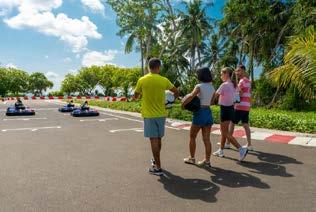
New resorts in 2025
Is guesthouse tourism threatening Maldives’ sustainable tourism model?

Record sea levels lead to unprecedented mangrove loss in Maldives
Pradeep Pathirana: Crafting culinary excellence, establishing team at Ayada Maldives
Behind the scenes: Mastering maintenance management in resorts
Unlocking potential of Maldives: Role of private investment in transforming uninhabited islands
Growing great chefs in Maldives
Grand Park Kodhipparu’s Ni Wayan Priyanka Diana: Embracing island life, cultivating success
When hospitality goes above and beyond: Race against time in Maldives
Kandima Maldives launches Fast Track: Ultimate oceanfront go-kart experience
Nominations for Hotelier Maldives Awards 2025 open
VARU by Atmosphere: Five years of authentic Maldivian luxury
Behind the scenes of the tropical paradise of Maldives, chefs like Daniel Patrick Navarro Agustin play a crucial role in delivering unforgettable dining experiences.
As the Junior Sous Chef at Grand Park Kodhipparu, Maldives, Daniel shares his remarkable journey in the culinary industry, highlighting his passion, challenges, and the art of cooking in one of the world’s most picturesque settings.
Daniel’s culinary journey began in 2010 when he first stepped into the kitchen at a resort in the Maldives. Starting as a kitchen helper, he quickly developed a passion for cooking and honing his craft. “I started in Coco Collection, where I worked for four years in buffet and Japanese restaurants. After three years, I was promoted to demi-chef and continued to grow my skills,” he recalls.
His experience in Japanese cuisine laid a strong foundation for his
career. Daniel moved on to work in various properties where he served as Chef de Partie. In 2022, he joined Grand Park Kodhipparu as a Chef de Partie and was later promoted to Junior Sous Chef, a role that involves leading a team and managing the kitchen’s daily operations.
Despite his impressive career trajectory, Daniel’s formal education in culinary arts was limited. “I’m actually an undergraduate. My journey has primarily been based on hands-on experience,” he explains. His time as a kitchen helper in Dubai provided valuable insights into the industry, helping him learn the intricacies of food preparation and kitchen management.
When asked about a typical day in his role, Daniel shares, “I currently
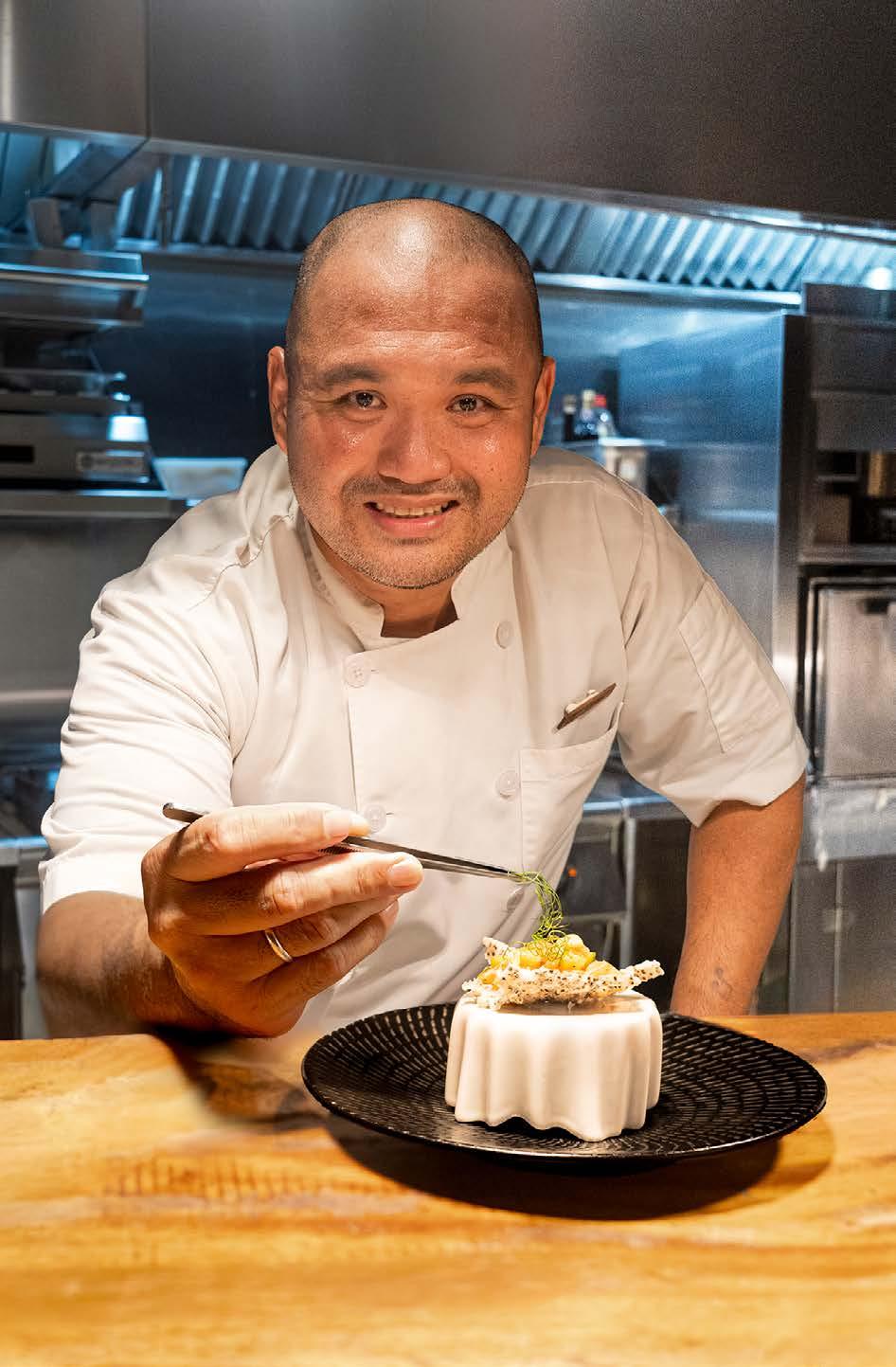
I guide my colleagues, teaching them what I’ve learned from my experiences, and we work together to create exceptional dishes
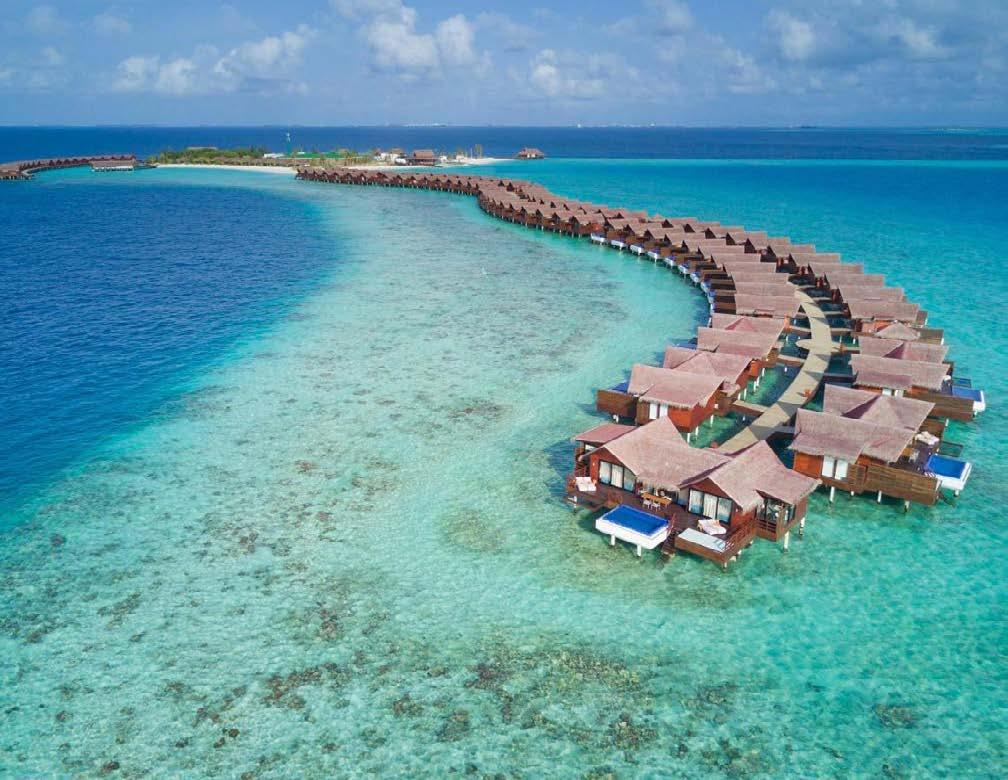
manage the Firedoor kitchen, which specialises in grilled dishes within an Italian fine dining concept.” As Junior Sous Chef, he oversees a team of chefs, ensuring they adhere to high culinary standards while fostering a collaborative environment. “I guide my colleagues, teaching them what I’ve learned from my experiences, and we work together to create exceptional dishes,” he says.
The pressures of working in a high-end resort come with their own set of challenges. “I’ve faced challenges, especially as a junior chef dealing with costings and menu development. But now, I’m adapting and learning how to create new menus and handle kitchen operations more effectively,” he adds, emphasising his commitment
to continuous improvement.
The culinary industry can be demanding, and Daniel acknowledges the difficulties he has encountered along the way. “One of the most challenging tasks has been learning the financial aspects of running a kitchen,” he reflects. “Initially, I struggled with costings and menu planning, but I’m now more comfortable handling these responsibilities.” His determination to overcome obstacles showcases his dedication to professional growth.
For aspiring chefs, Daniel offers sage advice: “Always work hard and love your job. Passion and dedication are essential in this industry.” He believes that a strong work ethic combined with a genuine love for cooking
can pave the way for success.
Daniel expresses gratitude for the opportunities he has received.
“I want to thank the company for choosing me for this opportunity,” he states. His journey, rooted in hard work and a passion for cooking, serves as an inspiring example for those seeking a career in the culinary arts.
With his specialty in sushi and experience in fine dining, Daniel Patrick Navarro Agustin embodies the spirit of innovation and excellence in the culinary world.
As he navigates the challenges and joys of being a Junior Sous Chef in the Maldives, he remains committed to crafting exceptional dining experiences that reflect the beauty of his surroundings.
Whether I was working in Europe, Asia, or the Maldives, understanding the people, their values,and how they connect with their surroundings has been essential
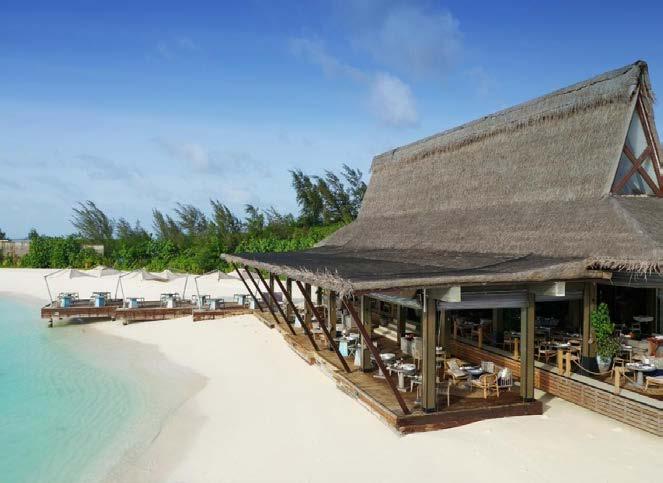


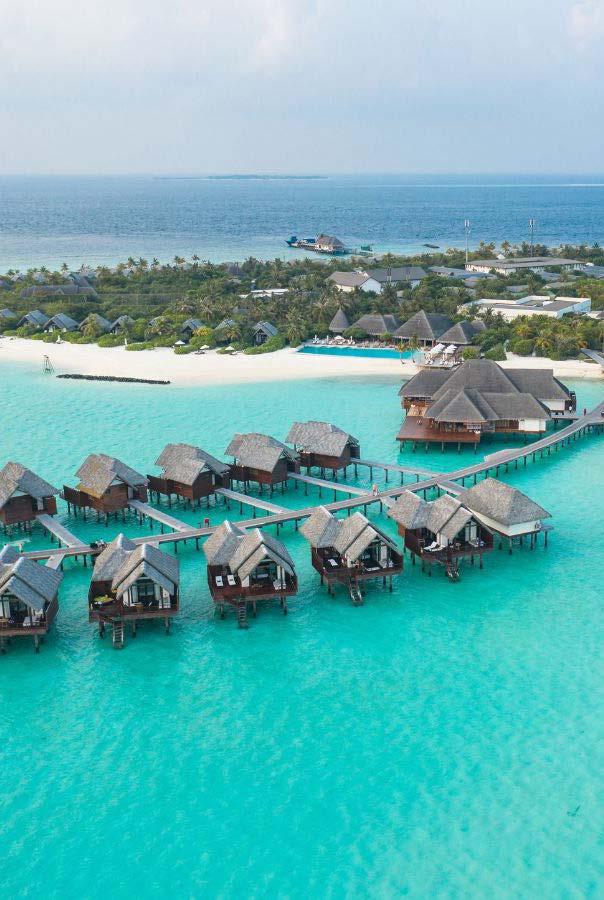
Nestled in the serene waters of the Raa Atoll, Heritance Aarah Maldives offers a retreat that combines the pinnacle of Maldivian hospitality with a premium all-inclusive experience. From the moment you step off the seaplane, the welcoming smiles and seamless service provide a glimpse into the unforgettable escape that awaits.
This luxurious property is more than just a resort; it’s an embodiment of indulgence, relaxation, and cultural immersion that captivates travellers from across the globe.
Choosing an Ocean Villa with a Pool proved to be a decision that defined the trip. The villa’s spacious interiors were designed
with a meticulous eye for detail, blending modern aesthetics with traditional Maldivian elements. Floor-to-ceiling glass doors invited endless views of the turquoise waters, and the private infinity pool offered a front-row seat to mesmerising sunsets.
One of the villa’s most enchanting features was the direct access to the lagoon, where snorkelling unveiled a vibrant house reef brimming with marine life. From schools of colourful fish to curious reef sharks, each underwater encounter was a testament to the rich biodiversity of the Maldives.
Beyond the villas, the resort’s expansive layout struck a perfect balance between intimacy and accessibility. Whether strolling
through lush tropical gardens or basking in solitude on pristine beaches, the thoughtful design ensured a tranquil experience, even during peak occupancy.
Across the Atoll
Heritance Aarah elevates the concept of all-inclusive dining with an impressive lineup of six restaurants and five bars. The culinary journey was diverse and delightful, with options ranging from international buffets to fine dining and authentic Maldivian cuisine.
Among the highlights was Ambula, the overwater restaurant specialising in Maldivian and Sri Lankan fusion. Dining on freshly caught seafood, accompanied
by the glow of a sunset, was a magical experience. The resort also excelled in delivering invilla dining, where meals were not just convenient but curated and beautifully presented.
Each dish reflected the creativity of the culinary team, who ensured every dietary preference was catered to with finesse. Be it vegan options or indulgent desserts, the attention to detail was evident in every bite.
The soul of Heritance Aarah lies in its team, whose unwavering dedication to guest satisfaction sets it apart. Our butler, Nafiu, exemplified this commitment, acting as a guide, concierge, and storyteller throughout our stay. From organizing daily itineraries to sharing insights into Maldivian culture, his warmth and professionalism elevated the holiday to an extraordinary level.
His ability to anticipate needs and personalise every interaction made us feel valued and at home. This level of service extended across the resort, where staff members greeted every guest with genuine smiles and a willingness to go above and beyond.
Heritance Aarah offers a plethora of activities, ensuring there is something for everyone. Water enthusiasts can dive into the house reef, embark on snorkelling excursions, or take guided diving trips to explore deeper underwater wonders. The dolphin cruise was a standout experience, as we watched a
The soul of Heritance Aarah lies in its team, whose unwavering dedication to guest satisfaction sets it apart.

playful pod of dolphins against the backdrop of the setting sun.
For those seeking relaxation, the resort provides numerous quiet nooks, private beachfront spots, and an exceptional spa experience. The Medi Spa offered treatments that blended ancient healing techniques with modern therapies, leaving us rejuvenated and refreshed.
Even with a packed itinerary, the resort’s ambiance allowed moments of reflection and serenity, making it equally appealing to adventureseekers and those in search of a tranquil escape.
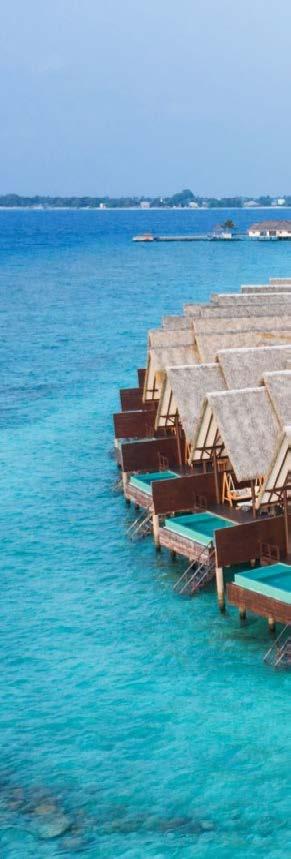

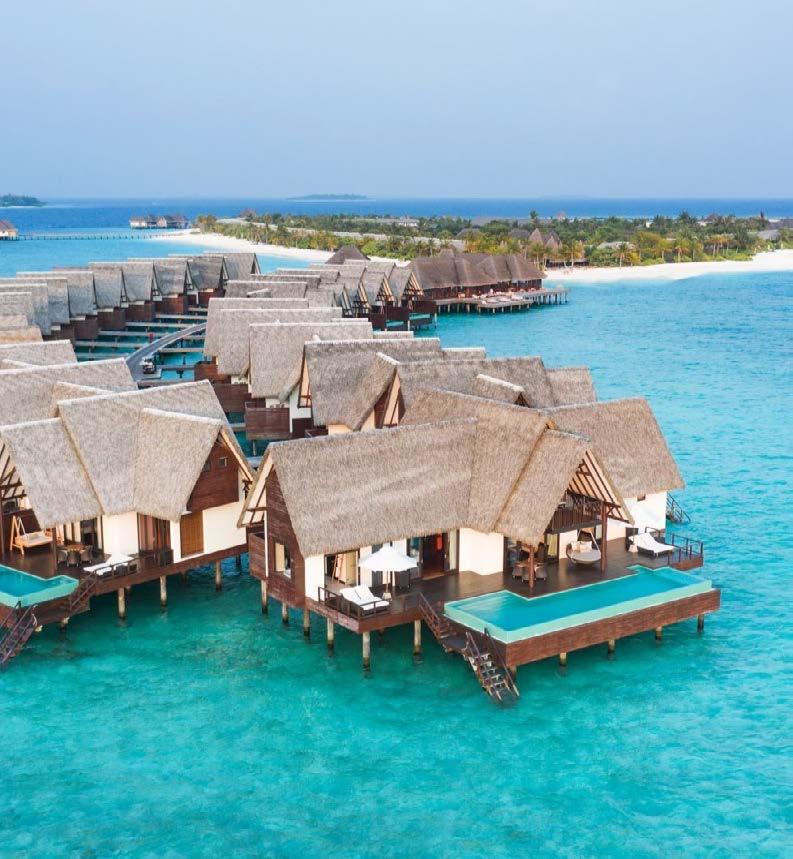


Sustainability Meets Luxury
Heritance Aarah stands out for its efforts to harmonise luxury with sustainability. From eco-friendly initiatives like glass bottle water stations to the preservation of marine life around its reef, the resort demonstrates a commitment to protecting the natural beauty that defines the Maldives. Guests are also encouraged to participate in conservation activities, fostering a deeper connection with the environment.
Heritance Aarah Maldives delivers a holistic experience that combines luxurious accommodations, world-class dining, enriching activities, and personalised service. Whether you’re celebrating a honeymoon, marking a milestone, or simply indulging in a well-deserved getaway, the resort caters to every desire.
The all-inclusive package is not just a convenience; it’s a promise of curated experiences that leave no room for compromise. From morning yoga sessions to evening cocktails under the stars, every moment at Heritance Aarah feels thoughtfully crafted to create lasting memories.
Heritance Aarah is more than a destination—it’s an invitation to rediscover joy, connection, and wonder in a setting that feels almost otherworldly. For travellers seeking the ultimate Maldivian escape, this resort is a masterpiece of hospitality, promising a stay that will linger in your heart long after you’ve departed its shores.

Cinnamon Dhonveli Maldives invites you to plunge into an underwater wonderland where adventure meets unparalleled beauty.
As one of the Maldives’ most sought-after diving destinations, the resort offers access to breathtaking dive sites that showcase the incredible diversity of marine life, creating a unique dive experience that beckons adventurers from around the globe.
With the expertise of Dive & Sale Maldives, a trusted name
in the diving industry for over 03 decades, guests are ensured a top-tier diving experience. Their seasoned instructors bring a wealth of knowledge and passion for the ocean, guiding you through renowned sites like Aquarium, HP Reef, Maldives Victory, Madi Miyaru Kan, Lankan Manta Point, Banana Reef, and Colosseum and much more. Each excursion reveals a vibrant underwater world filled with
stunning corals and a kaleidoscope of fish, where graceful manta rays, majestic eagle rays, and playful turtles await your discovery.
The dedicated team from Dive & Sale Maldives enriches your diving adventures with insights into the intricate relationships within this underwater paradise, ensuring that your experience is not only thrilling but also educational.

Whether you are a seasoned diver or just starting your journey, Cinnamon Dhonveli Maldives offers a captivating blend of adventure, beauty, and serenity.
Their commitment to safety and marine conservation further enhances your dive, allowing you to explore with peace of mind while contributing to the preservation of this magnificent ecosystem.
Cinnamon Dhonveli Maldives believes in celebrating the beauty of oceans while promoting sustainability and conservation. The commitment to protecting the marine environment means that guests can dive with a sense of purpose, knowing they are contributing to vital conservation efforts.
Whether you are a seasoned diver or just starting your journey, Cinnamon Dhonveli Maldives offers a captivating blend of adventure, beauty, and serenity. Discover the depths of the Indian Ocean, create lasting memories, and immerse yourself in the vibrant culture of Maldives. For those seeking more than just an escape, Cinnamon Dhonveli Maldives invites you to uncover the wonders that lie beneath the waves, forging unforgettable moments in a world where nature’s beauty remains untamed and eternal.

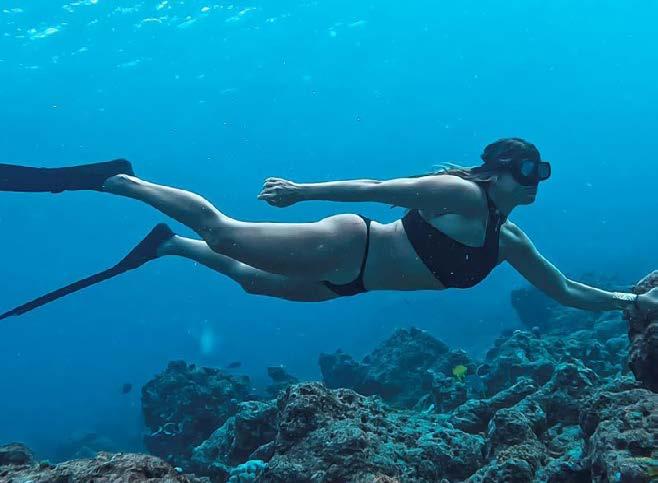
Behind the serene luxury and impeccable service of The RitzCarlton Maldives, Fari Islands, lies the unwavering dedication of talented individuals like Malsa Shiyam. As a Front Office Supervisor, Malsa has carved a path defined by passion, resilience, and an unrelenting commitment to hospitality. Her journey serves as an inspiration for aspiring hoteliers in the Maldives and beyond.
Malsa’s fascination with the world of hospitality began early in life, sparked during a family vacation when she was just five years old. “I vividly remember standing at the grand reception desk, mesmerised by the energy around me,” she recalls. A small yet impactful gesture from the General Manager—allowing her to stand behind the desk—left a lasting impression. For young Malsa, that moment symbolised the grandeur and excitement of the industry, planting the seed for a future career.
Years later, this curiosity blossomed into a full-fledged passion. After completing her education in Malaysia,
Malsa returned to the Maldives to begin her professional journey. Her first step into the hospitality world came through an internship at the prestigious Cheval Blanc Randheli. It was here that her love for Front Office operations was solidified. “Interacting with guests from diverse backgrounds was incredibly fulfilling. I knew then that this was my calling,” she shares.
Following her internship, Malsa’s career trajectory saw her gaining valuable experience at some of the most renowned properties in the Maldives. From Cheval Blanc Randheli, she moved on to One&Only Reethi Rah, and later to The St. Regis Maldives Vommuli Island. Each role added new dimensions to her skill set and tested her adaptability. Her transition to The Ritz-Carlton Maldives, Fari Islands, marked a turning point. Joining the resort as part of its pre-opening team in 2021, she began as an At Your Service Agent. Within just six months, her exceptional performance and leadership qualities earned her a promotion to Front Office Supervisor.
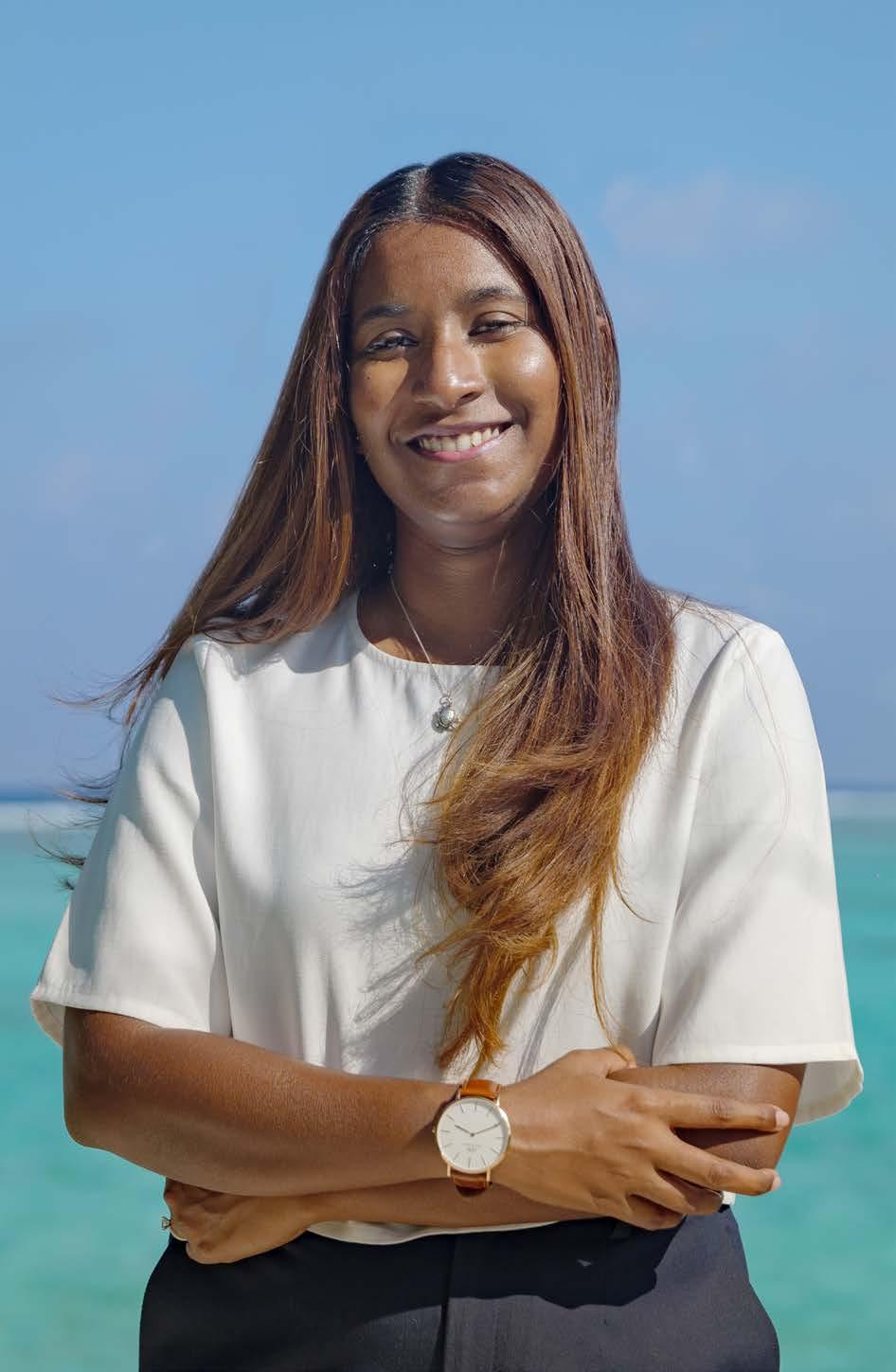
Interacting with guests from diverse backgrounds was incredibly fulfilling. I knew then that this was my calling.
In her current role, Malsa leads a dynamic team of six, ensuring that every guest interaction reflects The Ritz-Carlton’s legendary service. “One of the most rewarding aspects of my role is supporting my team. I believe fostering a positive and motivating environment helps everyone strive for their best,” she explains.
Malsa’s leadership philosophy is rooted in empathy and open communication. She emphasises leading by example, stepping in to assist her team during busy periods, and maintaining an opendoor policy. “When your team feels valued and supported, it reflects not only in their performance but also in the guest experience,” she notes. This approach has proven instrumental in navigating the challenges of her career. From
adapting to the multifaceted responsibilities at The St. Regis Maldives to the rigorous demands of a pre-opening property, Malsa has demonstrated resilience and a willingness to learn. Reflecting on her pre-opening experience at The Ritz-Carlton Maldives, she describes it as a period of intense growth. “It was a challenging time, especially during Ramadan and amid the pandemic. But it was also one of the most rewarding phases of my career,” she shares.
At The Ritz-Carlton Maldives, innovation and sustainability are at the heart of the guest experience— values that resonate deeply with Malsa. The property was the first Marriott location to implement a paperless check-in process using iPads, a move that enhanced efficiency while reducing
waste. Another initiative close to Malsa’s heart is the creative repurposing of used coffee grounds into coffee scrubs. “It’s a perfect example of how luxury and sustainability can coexist,” she says. These efforts not only elevate the guest experience but also align with the growing demand for environmentally conscious practices in the industry. “Sustainability isn’t just a trend—it’s the future,” Malsa asserts. “Guests increasingly value properties that make a positive impact on the environment, and it’s incredibly fulfilling to be part of that change.”
In addition to sustainability, The Ritz-Carlton Maldives places a strong emphasis on celebrating Maldivian culture and giving back to the community. From incorporating local traditions—

such as using the term ‘Aris Meeha’ for butlers and welcoming guests with the sound of the sangu (a traditional Maldivian horn)—to initiatives like donating computers to local schools, the resort fosters a deep connection with its surroundings. “Seeing the creativity of local students during art competitions using recycled materials is incredibly inspiring,” Malsa shares. These efforts underscore the property’s commitment to making a difference beyond its luxurious offerings.
As an emerging leader in the industry, Malsa is optimistic about the future of hospitality in the Maldives. She is particularly heartened by the increasing focus on inclusivity. “It’s wonderful to see more women joining the industry, and I hope to see more in leadership roles,” she says. Malsa is also committed to mentoring the next generation of hoteliers. Drawing from her own experiences, she provides her team with regular feedback, growth opportunities, and unwavering support. “My goal is to inspire and uplift others, just as my mentors did for me,” she explains.
Despite her demanding role, Malsa prioritises work-life balance. Living on the Fari Campus, just a short distance from the resort, allows her to unwind and explore her passions. “In my free time, I enjoy playing the guitar, exploring music, reading, and watching series. It’s important to recharge and nurture your interests outside of work,” she says.
For aspiring hoteliers, Malsa offers simple yet powerful advice: “Stay curious and open to learning.

When your team feels valued and supported, it reflects not only in their performance but also in the guest experience
Build strong relationships and don’t be afraid to step out of your comfort zone. Challenges will only help you grow.” As she continues to excel in her career, Malsa embodies the essence of modern hospitality—blending innovation, culture, and community. Her journey, from a fascinated fiveyear-old to a leader at The RitzCarlton Maldives, is a testament to the limitless possibilities that come with passion and determination. “Stay confident, keep pushing forward, and you’ll find endless opportunities to grow,” she advises.

Ayada Maldives is located in the southern Gaafu Dhaalu Atoll, which is accessible via a 55-minute domestic flight from Velana International Airport followed by a 45-minute speedboat ride. Situated on a private island, the resort offers guests access to pristine beaches and a vibrant coral reef, providing a unique blend of seclusion and proximity to the natural beauty of the Maldives.
The resort presents a wide range of accommodation options, ensuring that guests can select the option that best suits their preferences. The various accommodations include overwater villas, beachfront suites, and garden residences, each designed to meet different needs. All rooms come equipped
with private pools and outdoor spaces for relaxation. The interiors of these accommodations are thoughtfully designed, incorporating elements of modern style while incorporating traditional Maldivian craftsmanship. This combination creates a warm, inviting environment. In addition, amenities like high-speed internet, entertainment systems, and personal minibars ensure that guests have everything they need for a comfortable stay.
Overwater villas are a key feature of Ayada Maldives, offering guests direct access to the lagoon. These villas are ideal for those interested in marine activities, such as snorkelling and diving. The beachfront suites are surrounded by lush vegetation,
providing an added sense of privacy and direct access to the beach. Larger families or groups can opt for the residences, which offer spacious living areas and private gardens, making them well-suited for extended stays or group gatherings.
Ayada Maldives features an array of dining venues, each offering distinct culinary experiences to cater to a variety of tastes. The resort offers a diverse selection of restaurants, including both casual and fine dining options.
Ocean Breeze is an overwater restaurant that focuses on European cuisine. Open for lunch and dinner, it serves a selection of dishes, including grilled seafood, homemade pasta, and premium
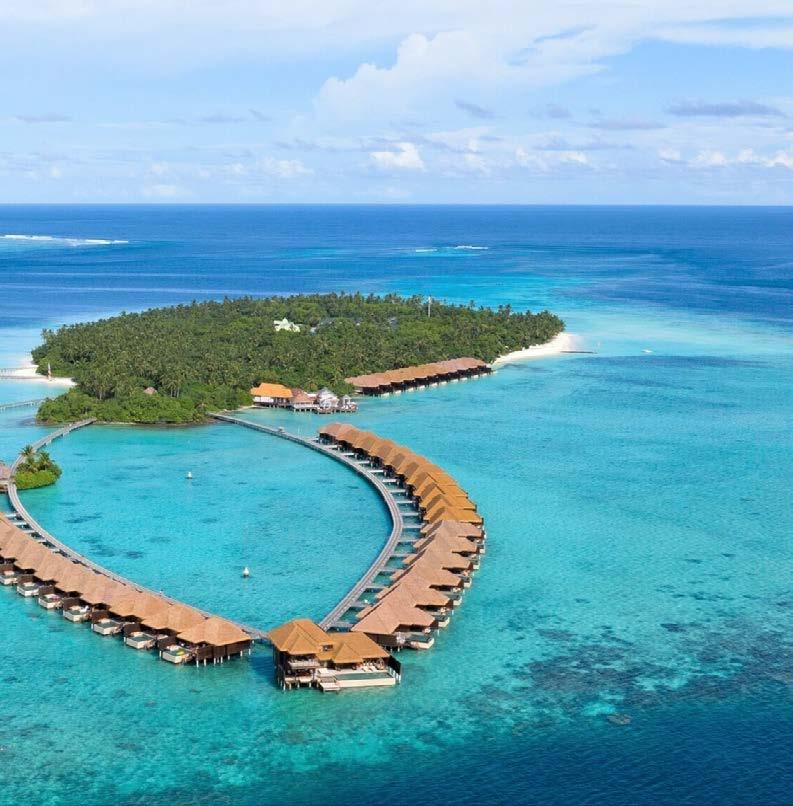
steaks. The unique location of the restaurant allows guests to enjoy a meal while overlooking the lagoon.
Mizu is a teppanyaki grill where guests can watch chefs prepare their meals on a hot iron plate. The menu emphasises high-quality ingredients, and guests can also enjoy a selection of sakes and wines to complement their meals.
Kai offers a taste of Asia with dishes inspired by the culinary traditions of China, Japan, Thailand, Vietnam, and Indonesia. Sushi, sashimi, and local seafood are highlights of the menu, offering a diverse range of flavours and textures.
Zero Degree is a more casual venue, located by the pool. This restaurant offers international dishes, including fresh salads, Middle Eastern options, and European meals. It provides a relaxed setting for those


looking to enjoy a lighter meal.
Magu serves as the resort’s main restaurant, offering a buffet with nightly rotating themes. Guests can enjoy a variety of cuisines, including Mediterranean, Maldivian, and Mexican dishes, ensuring a wide range of options.
Sea Salt, located on the beach, offers an informal setting where guests can enjoy barbecue nights. Grilled meats and seafood are served under the stars, allowing diners to experience the natural surroundings of the island while enjoying their meal.
Ottoman Lounge is a Turkishinspired café offering traditional coffee and tea. The café features low-seating arrangements, providing a unique and intimate experience for guests looking for a quiet moment.
Ile de Joie is located over the water and specialises in wine and cheese pairings. Guests can also enjoy a curated selection of
cognacs and whiskies, making it an ideal venue for those who appreciate fine beverages.
For those who prefer customised dining experiences, Ayada Maldives offers private options, including beach barbecues and in-villa meals that can be tailored to individual preferences.
The resort also focuses on wellness and relaxation, with AySpa offering a comprehensive range of treatments. The spa spans 3,500 square metres and features eight treatment villas, some of which include hydrotherapy baths, private courtyards, and outdoor showers. Among its signature offerings are the Turkish Hammam and a Vichy shower room, which provide unique relaxation experiences.
Guests can access several relaxation areas, including heated vitality pools, cold plunge pools, steam rooms, and saunas. The spa menu includes massages, facials, and body treatments that combine traditional Maldivian
For guests looking to immerse themselves in the local culture, the resort offers excursions to nearby islands. These trips provide insights into Maldivian traditions, such as weaving and coconut tasting.
and modern wellness practices. In addition, yoga and meditation sessions are available, helping guests to find balance and relaxation during their stay.
Ayada Maldives offers an extensive range of activities and excursions to keep guests engaged during their stay. For those interested in marine exploration, the house reef is home to a wide variety of marine life, and guided snorkelling tours as well as scuba diving experiences are available. The resort also offers surfing excursions to nearby surf breaks, with the trips tailored to the current weather conditions.
Fishing enthusiasts can partake in sunset fishing trips aboard traditional dhoni boats, allowing them to engage in local fishing practices. Dolphin spotting trips are also popular among guests, with boat rides providing the opportunity to observe spinner dolphins in their natural habitat.
For guests looking to immerse themselves in the local culture,
the resort offers excursions to nearby islands. These trips provide insights into Maldivian traditions, such as weaving and coconut tasting. There are also private picnic and sandbank visits, where guests can enjoy a secluded outing on nearby islands or sandbanks, away from the resort.
Additional excursions include glass-bottom boat tours and island safaris, both of which focus on exploring the region’s biodiversity. These activities offer guests a deeper connection with the natural environment surrounding the resort.
Ayada Maldives also serves as a popular destination for weddings, offering various packages and venues to suit the preferences of couples. The ‘White Room’, the
resort’s largest wedding chapel, is surrounded by landscaped gardens, making it a primary venue for those seeking a traditional wedding ceremony. Couples can also exchange vows on the beach or aboard a traditional Maldivian dhoni boat. A dedicated wedding planner is available to assist with the logistics and personalisation of each ceremony.
The resort is committed to sustainability and eco-friendly practices, incorporating waste recycling, energy-efficient operations, and coral conservation programs into its day-to-day activities. In addition, Ayada Maldives sources ingredients from local communities, reducing its carbon footprint while supporting the nearby economy.
Service at Ayada Maldives is centred around personalisation. Staff members assist guests with planning activities and provide discreet yet attentive service throughout their stay. High-speed internet is available throughout the resort, allowing guests to stay connected for work or leisure during their visit.
Ayada Maldives offers a comprehensive range of accommodations, dining options, and activities, catering to a variety of traveller preferences. Its emphasis on sustainability and personalised service ensures a fulfilling and responsible stay. The resort’s ability to blend cultural authenticity with modern amenities positions it as an attractive option for those visiting the Maldives.


Cinnamon Dhonveli Maldives invites you to plunge into an underwater wonderland where adventure meets unparalleled beauty.
The Maldives, renowned for its pristine waters, luxurious overwater villas, and exclusivity, has long been celebrated as a high-end tourist destination. For decades, its tourism model revolved around luxury resorts located on uninhabited islands, offering seclusion and premium experiences. However, a pivotal shift in 2008, sparked by a legal challenge from a visionary
entrepreneur on Maamigili Island, transformed the landscape of Maldivian tourism. While this change opened new doors for local economic participation, it also raises pressing questions about the sustainability and future of our tourism industry.
The landmark court decision allowing guesthouses on inhabited islands ushered in a
wave of local entrepreneurship. Islanders began converting their homes into guesthouses, offering affordable accommodations and authentic cultural experiences. This democratization of tourism was a boon for local communities, enabling them to directly benefit from the industry. In a country where tourism had largely been the domain of wealthy resort developers and foreign

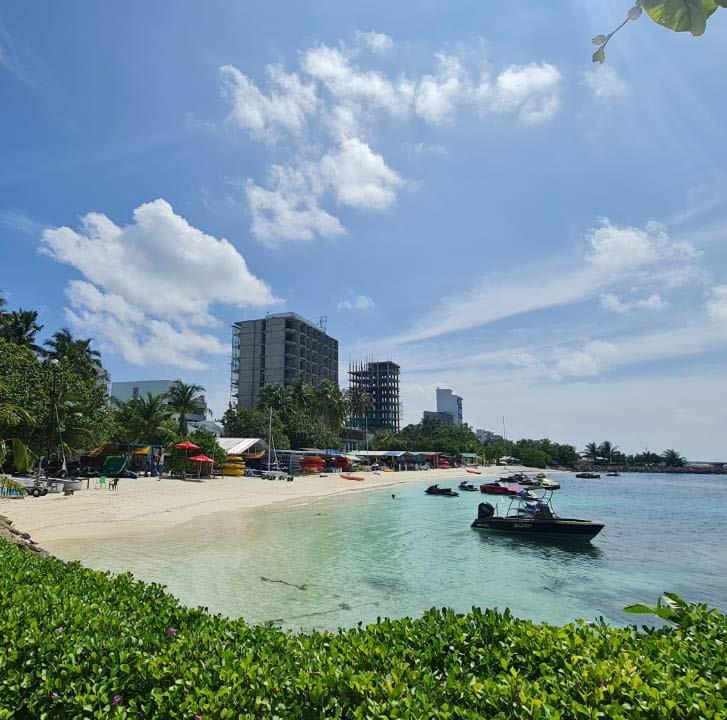
investors, guesthouses were seen as a beacon of inclusivity and self-empowerment.
However, the euphoria of this newfound opportunity masked a critical oversight: the government’s lack of preparation for this seismic shift. No strategic plans, regulations, or guidelines were introduced to manage the burgeoning guesthouse sector. What began as a grassroots movement for communitydriven tourism soon attracted larger investors, leading to the unchecked development of multi-story hotels on local islands.
Take Maafushi, for example. Once a quaint fishing village with a population of 2,200, the island
In a country where tourism had largely been the domain of wealthy resort developers and foreign investors, guesthouses were seen as a beacon of inclusivity and selfempowerment.
has become emblematic of the guesthouse tourism boom. By 2022, its population had doubled, and the island hosted over 1,700 registered guesthouse and hotel rooms, with more under construction. While this transformation has undoubtedly boosted local employment and economic activity, it has also raised concerns about overdevelopment, environmental degradation, and the erosion of traditional lifestyles.
The lack of urban planning on Maafushi and other local islands has resulted in overcrowding, strain on infrastructure, and questions about waste management and environmental sustainability. The Maldives’ brand as a luxury destination is also under threat.
Tourists drawn to the Maldives for its exclusivity and serenity may find themselves disappointed by crowded islands teeming with guesthouses and hotels.w
Furthermore, the unregulated expansion of guesthouse tourism challenges the very sustainability model the Maldives once prided itself on. The resort model, while exclusive, was also compartmentalized, minimizing environmental impact by isolating tourism activities to specific islands. The spread of tourism to inhabited islands complicates this equation, increasing the footprint on fragile ecosystems and introducing socio-economic challenges that the government has yet to address adequately.
The question remains: is this the sustainable development we envisioned? Can the Maldives strike a balance between inclusivity in tourism and preserving its environmental and cultural integrity?
To move forward responsibly, the government must take decisive action. A robust regulatory
framework is urgently needed to guide guesthouse tourism. Local councils should be empowered and incentivized to implement zoning laws, manage waste effectively, and preserve natural habitats. Training programs for guesthouse operators could help standardize service quality, ensuring that the Maldives remains a competitive destination.
Equally important is the need for community engagement. Local residents should play an active role in shaping the development of their islands, ensuring that tourism benefits them without compromising their way of life.
Guesthouse tourism is a doubleedged sword. It has the potential to democratize economic opportunities and diversify the Maldivian tourism industry, but without proper planning and regulation, it could erode the very assets that make the Maldives unique. The time to act is now. Sustainable development is not just an ideal; it is a necessity for the Maldives to thrive as a global tourism leader while safeguarding its future for generations to come.
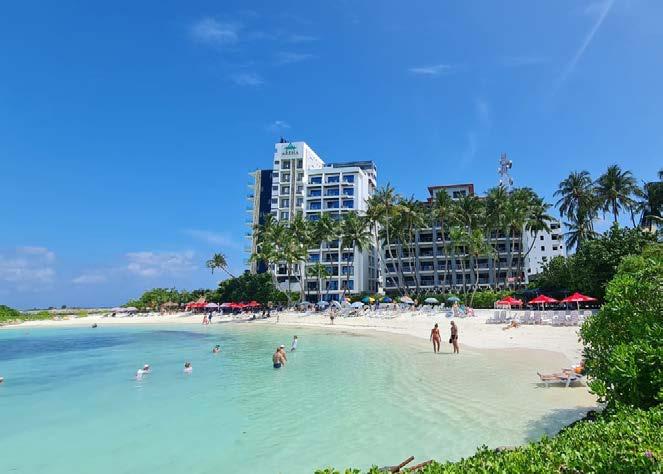
In a country where tourism had largely been the domain of wealthy resort developers and foreign investors, guesthouses were seen as a beacon of inclusivity and selfempowerment.

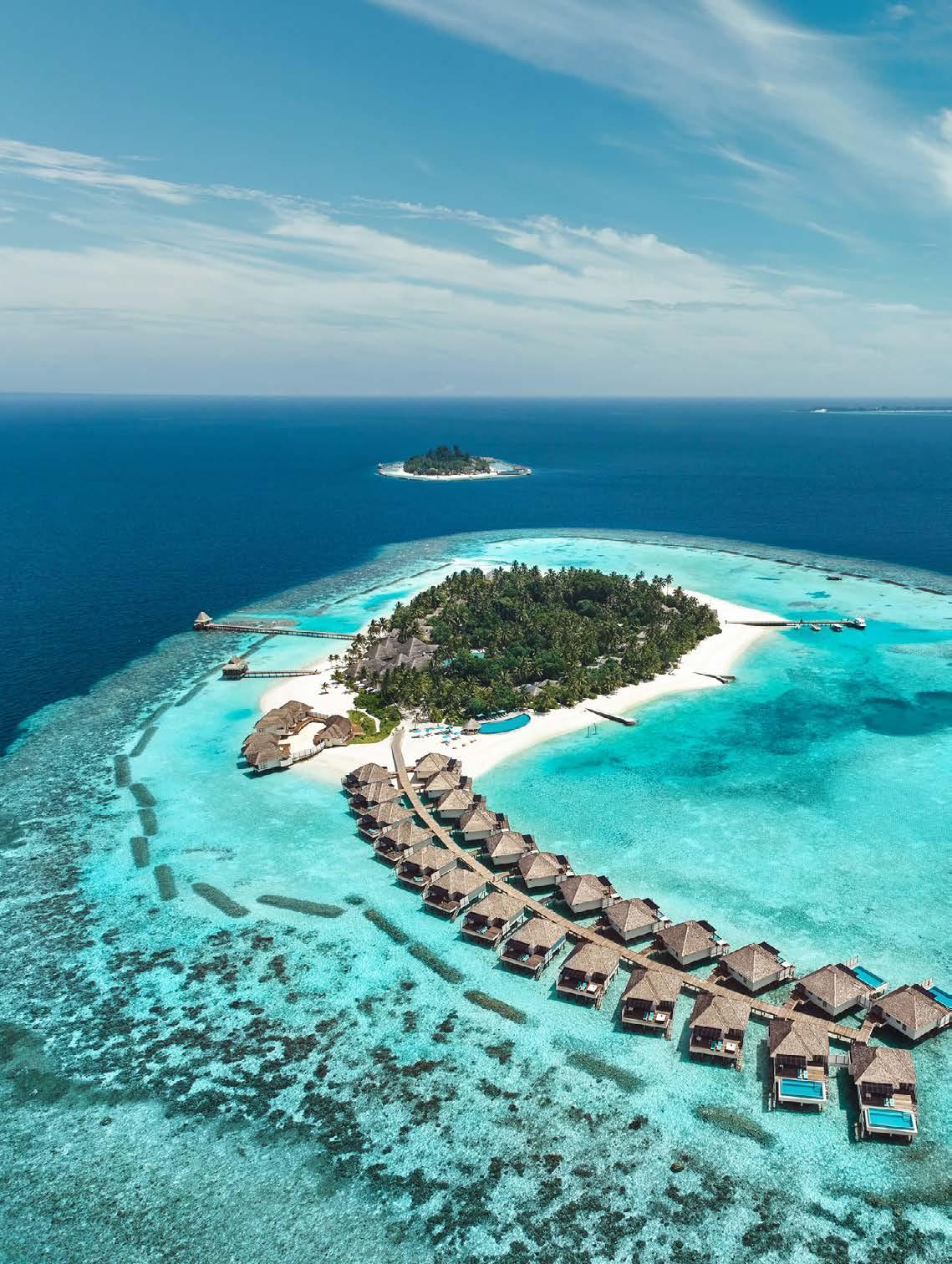

The Maldives continues to be a global hotspot for luxury travel, with its pristine beaches, turquoise waters, and unparalleled hospitality drawing millions of visitors annually. As the world shifts toward more conscious and tech-driven tourism, the Maldivian industry is adapting to meet new demands.
Here are the key trends shaping the Maldives’ tourism landscape for 2025 and actionable insights for hotel owners and operators to thrive.
Sustainability at the Forefront Travellers in 2025 are increasingly eco-conscious, demanding destinations that align with their environmental values. The Maldives’ fragile marine ecosystems make sustainable tourism not only desirable but necessary. Resorts adopting renewable energy solutions, reducing single-use plastics, and incorporating marine conservation initiatives will have an edge.
Key examples include eco-resorts like Soneva Fushi and Six Senses Laamu, which have pioneered
practices like solar energy use and sustainable dining. Hotels can also partner with NGOs to educate guests on coral reef protection and marine life conservation, enriching their experiences while fostering environmental stewardship.
Luxury Reimagined: Bespoke Experiences
The definition of luxury is evolving. Beyond opulence, travellers now seek exclusivity and hyperpersonalised experiences. The Maldives leads in offering such experiences, from private island rentals to dining beneath the ocean. In 2025, resorts should enhance personalisation, such as crafting itineraries tailored to individual guest preferences or hosting curated wellness retreats.
Emerging sub-trends include “luxpeditions,” where guests combine luxury stays with adventurous activities like underwater photography sessions, and “wellness safaris,” which blend spa treatments with outdoor fitness programmes. These unique offerings help operators differentiate in a competitive market.
As tech-savvy millennials and Gen Z travellers grow in influence, integrating technology into guest services is paramount. Smart room features, digital concierge systems, and seamless check-in processes enhance the guest experience while reducing operational costs.
Moreover, augmented and virtual reality (AR/VR) can be
used to provide immersive previews of resorts or virtual diving experiences. Blockchain technology for secure payments and digital passports are also trends to monitor for enhancing customer convenience.
Modern tourists are no longer satisfied with surface-level visits. They seek deeper connections with local culture, cuisine, and traditions. Hoteliers can integrate cultural storytelling into their offerings by designing immersive experiences such as Dhivehi cooking classes, island tours led by local experts, and folklore-inspired performances.
The Maldivian government’s initiatives to highlight local crafts and festivals, like Eid celebrations and Bodu Beru music performances, align with this trend. Resorts that balance luxury with


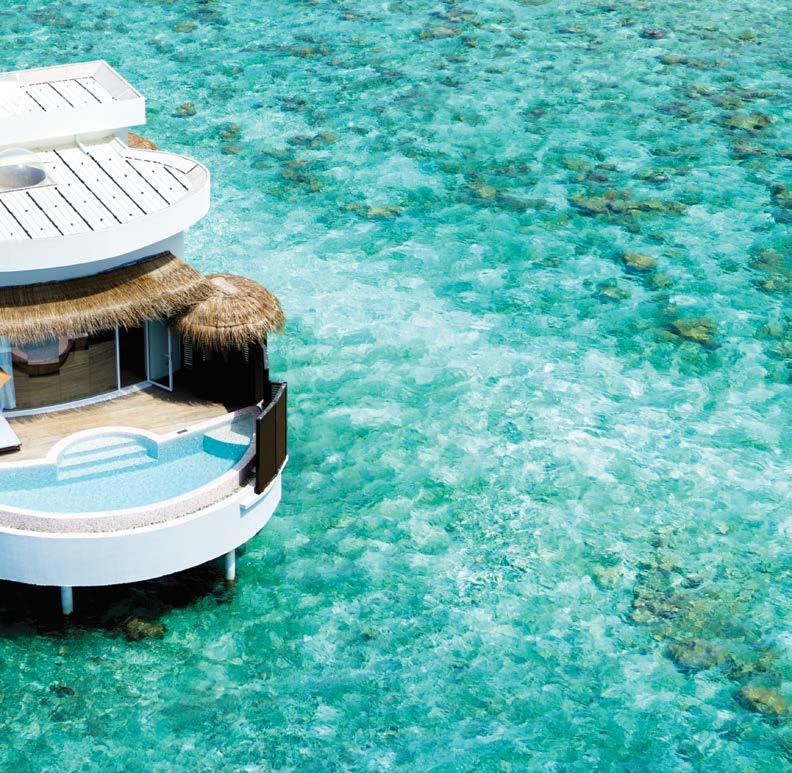
authentic cultural engagement stand to gain significantly.
The Maldives is broadening its appeal beyond couples to include families and groups. Resorts are increasingly catering to this market by introducing larger villas, kids’ clubs, and educational programs centered around marine life.
Family-friendly properties like Atmosphere Kanifushi and Sun Siyam Iru Fushi are leading the charge with activities designed for multi-generational travelers.
Operators should also consider adding group-centric facilities, such as private dining for large parties or themed group excursions, to attract travellers seeking shared experiences.
Modern tourists are no longer satisfied with surfacelevel visits. They seek deeper connections with local culture, cuisine, and traditions.
The demand for wellnessfocused vacations is accelerating, with the Maldives perfectly positioned to meet this need. Wellness travelers are looking for retreats that combine luxury with holistic well-being, from yoga sessions overlooking the ocean to detox packages featuring locally sourced ingredients.
Key players like Vakkaru Maldives, Anantara Veli and JOALI BEING already excel in wellness offerings. The next frontier involves integrating digital detox programmes and mental healthfocused workshops, which align with global trends emphasising emotional well-being.
After a significant dip during the pandemic, the Chinese market is resurging. With direct flight connectivity improving and China’s outbound travel restrictions eased, the Maldives is expected to see a major influx of Chinese tourists in 2025.
To cater to this demographic, hotels should focus on language support, dining options featuring Chinese cuisine, and tailored marketing campaigns.
Operators who prepare to accommodate this market will be well-positioned for success.
The Maldives continues to dominate the market for destination weddings and honeymoons. However, 2025 will see a shift toward celebrations beyond weddings, such as milestone birthdays and corporate
retreats. Resorts that develop event-friendly infrastructure, such as larger banquet halls and customisable outdoor spaces, will capitalize on this trend.
The expansion of Velana International Airport and improved domestic connectivity are key developments for 2025. These upgrades will reduce transit times to remote atolls, making lesserknown regions more accessible to international travelers.
Investing in speedboat transfers or seaplane charters is a smart move for operators looking to tap into newly accessible markets. Additionally, partnerships with airlines to offer bundled travel packages can help attract budget-conscious tourists.
Gastronomy as an Experience
Culinary tourism is gaining momentum, with visitors seeking unique and memorable dining experiences. The Maldives’ underwater restaurants, farm-totable menus, and seafood-centric dishes are strong selling points.
To stand out, resorts can collaborate with Michelin-starred chefs for exclusive dining events or host culinary tours that explore traditional Maldivian cooking methods. Sustainability in food sourcing will also remain a crucial factor for discerning diners.
While the prospects for the Maldives’ tourism industry are optimistic, challenges such as rising travel costs due to tax increases, climate change, and geopolitical instability could
impact growth. Collaboration between public and private stakeholders will be essential to ensure resilience and adaptability.
By focusing on sustainability, leveraging technology, and continuously innovating guest experiences, the Maldives can maintain its reputation as a world-class destination in 2025. Hotel owners and operators who adapt to these trends will be well-positioned to lead the industry forward.
The Maldives is more than a destination—it’s an evolving narrative of luxury, culture, and
sustainability. As 2025 unfolds, hoteliers have the opportunity to redefine what it means to offer extraordinary experiences. With careful planning and forwardthinking strategies, the Maldives will continue to be a beacon of inspiration for travelers worldwide.
This year presents not only challenges but also a plethora of opportunities. By aligning with global trends and meeting the expectations of increasingly sophisticated travelers, the Maldivian tourism industry can secure its place at the pinnacle of global hospitality.
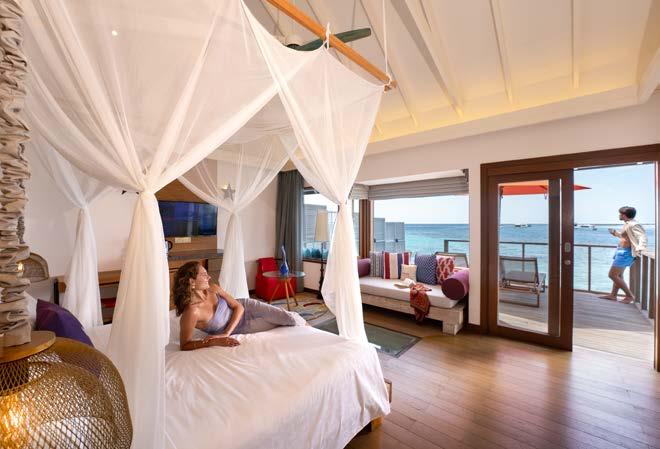

Maldives, synonymous with pristine beaches, turquoise waters, and luxury hospitality, is set to welcome a new wave of resorts in 2025, promising to redefine the standards of opulence and innovation. Each property brings unique offerings, captivating designs, and unforgettable experiences, catering to travellers from every walk of life. Here, we delve into six exciting resorts opening soon, each contributing to the Maldives’ ever-evolving hospitality landscape.
Up and coming hospitality firm SIX & SIX PRIVATE ISLANDS is poised to transform hospitality in the Maldives over the next six years.
SIX & SIX’s first resort, RAH GILI MALDIVES, is perched on the edge of the South Malé Atoll beside an exclusive dolphin sanctuary where hundreds of the playful mammals gather during breeding season. On land, guests will indulge in a range of fine dining, one-off events, and cultural happenings.
Opening Q4 2025, guests will be able to choose from the resort’s 74 pool villas, including 38 overwater, ranging from 120 to 200 square metres and 8m x 2.5m pools. Sleek design, whimsical surprises and buzzing social spaces will combine to create an exclusive haven for in-the-know globetrotters.


Set in the North Ari Atoll, Ananea Madivaru is poised to open its doors in winter 2024/2025. This sophisticated resort spans two islands connected by an overwater jetty, offering guests a dual-island experience surrounded by a vast lagoon and a vibrant house reef.
The resort’s 110 villas are categorised into five types, each combining modern comfort with the timeless traditions of the Maldives. Whether nestled on white sandy beaches or perched overwater, the villas invite guests to immerse themselves in luxury while basking in breathtaking ocean views.
Highlights of the resort include its Overwater Spa, a sanctuary designed to harmonise body and mind against the serene backdrop of the Indian Ocean. For diving and snorkelling enthusiasts,
the rich marine biodiversity surrounding the island provides an unparalleled underwater spectacle. Accessible via a 20-minute seaplane journey, Ananea Madivaru epitomises an escape into a tranquil, luxurious paradise.
Infinite Maldives by Cocoon, located in Male Atoll, introduces a groundbreaking concept as the Maldives’ first fully dedicated resort-residence. Designed by the renowned Pritzker Prize-winning architect Shigeru Ban, this ultra-luxurious property offers 44 villas—a mix of water and land options—for purchase, allowing owners to enjoy the dual benefits of real estate investment and unmatched island living.
Shigeru Ban’s visionary approach ensures that each villa reflects innovative design principles and a deep respect for nature. Situated just 35 minutes from Velana International Airport, the resort offers round-the-clock accessibility, making it ideal for global travellers.
Beyond private villas, Infinite Maldives promises a wealth of amenities, including fine-dining restaurants, rejuvenating wellness centres, sports fields, and dedicated spaces for children. Neighbouring iconic resorts like Patina Maldives and The RitzCarlton Maldives, Fari Islands, this property is set to attract those seeking a perfect blend of luxury, lifestyle, and investment potential.


Nammos Resort Maldives brings the legendary Mykonian spirit to the Maldivian shores, merging bohemian luxury with sustainable living. With a commitment to eco-friendly practices, the resort ensures harmony between its lavish offerings and the natural beauty of the Maldives.
Nammos captures the essence of Aegean-inspired design, seamlessly integrating the simplicity of Mykonos with the tropical allure of the Indian Ocean. Guests can expect signature Nammosstyle service across its restaurants, a world-class spa offering Hellenic-inspired treatments, and suites that blend freedom with sophistication.
The resort extends its ethos of authentic Mykonian hospitality, aiming to deliver a unique experience where luxury meets tradition. Scheduled to open in 2025, Nammos Maldives will join its flagship properties in Mykonos and Abu Dhabi, continuing its legacy of timeless glamour.
Located in the North Male Atoll, Centara Mirage Lagoon Maldives promises endless fun and bonding opportunities for families. Designed with a vibrant underwater-world theme, this familycentric resort features 145 villas, ranging from beachfront to overwater accommodations.
The resort’s standout attraction is its expansive water complex, complete with a lazy river, kids’ pool, water playground, and thrilling slides. Children can enjoy dedicated activities at the Kids’ Club and Candy Spa, while adults indulge in serenity at the award-winning SPA Cenvaree.
As part of The Atollia by Centara Hotels & Resorts, guests have access to a multi-island wonderland filled with diverse dining options and adventurous activities. Whether it’s exploring the underwater marvels or relaxing in interconnecting family rooms, Centara Mirage Lagoon Maldives ensures every family member finds joy and relaxation.

Scheduled to open in late 2025, Mandarin Oriental Bolidhuffaru Reef spans three private islands in the South Male Atoll. This ambitious project combines world-class architecture by Saota and design finesse by HBA London, offering guests an immersive blend of luxury and nature.
The 120-key resort will feature overwater and beach villas, each designed with sleek simplicity inspired by Mies van der Rohe. Guests can indulge in culinary delights across seven dining venues, rejuvenate at the Mandarin Spa’s 12 treatment suites, and enjoy a host of recreational activities, including water sports, diving, and tailored wellness programs.
A unique feature of the resort is its Learning Academy, offering enriching experiences that reflect a commitment to holistic guest engagement. With proximity to Male and a focus on sophisticated luxury, Mandarin Oriental Bolidhuffaru Reef is set to redefine island living.
The 2025 debut of these six resorts signals a dynamic era for Maldivian hospitality. From Ananea Madivaru’s tranquil twin-island charm to Infinite Maldives’ groundbreaking resort-residence model, each property brings something unique to the table. Nammos Resort Maldives transports the Aegean spirit to the Indian Ocean, while Centara Mirage Lagoon focuses on family-centric adventures. Meanwhile, Mandarin Oriental Bolidhuffaru Reef promises unparalleled luxury across three pristine islands.
As these resorts prepare to open their doors, the Maldives continues to solidify its position as a premier destination for luxury, innovation, and unforgettable experiences. For hoteliers and travellers alike, these developments offer a glimpse into the future of paradise. Whether for leisure, investment, or family bonding, the Maldives of 2025 awaits with endless possibilities.

A scientific study has revealed how record sea levels in 2020 led to widespread mangrove deaths across the Maldives, affecting about 25% of islands containing mangrove forests.

The research, published in Nature. com in November 2024, focused on basin mangrove forests, examining both inhabited and uninhabited islands. These basin forests, situated parallel to the shoreline behind carbonate banks, experienced significant dieback with no preceding large storm events or tropical cyclones.
Between 2017 and 2020, these mangroves couldn’t keep pace with rising seas. While mangrove sediments accumulated at 6.40 millimetres yearly (with a margin of error of 0.69mm), sea levels rose at 30.50 millimetres per
year (with a margin of error of 23.30mm) - five times faster than the trees could adapt.
The research team studied six islands across the Maldives: Kelaa, Keylakunu, Neykurendhoo, Goidhoo and Feydhoo in the north, and Hoandedhdhoo in the south. Their findings showed severe damage in basin forests, with Hoandedhdhoo island losing 53.39% of its mangroves and Neykurendhoo island losing 27.38%. All study sites contained basin mangrove forests, with Keylakunu being the only uninhabited island among them.
The 2019-2020 Indian Ocean Dipole event, recorded as the second strongest in history, triggered these record-high sea levels. Scientific analysis of dead trees showed reduced stomatal conductance compared to living ones, indicating severe salt stress.
The mangrove species Bruguiera cylindrica, which has low salt tolerance and lacks salt glands, was particularly affected. The destruction pattern typically began in the centre of low-lying basins and spread outwards, according to the paper.

Earlier data shows that between 1999 and 2017, these mangroves had successfully adapted to gradual sea level changes. During this period, mangrove sediment built up at 5.39 millimetres per year (with a margin of error of 0.97mm), while sea levels rose at 3.09 millimetres annually (with a margin of error of 3.16mm).
The impact extended beyond the Maldives. During the same period, other Western Indian Ocean nations reported mangrove losses, with the Seychelles losing 0.10 hectares and Comoros losing 0.96 hectares.
As climate change continues and extreme events become more frequent, the study suggests similar mangrove diebacks could become more common, highlighting the need for adaptive conservation strategies.
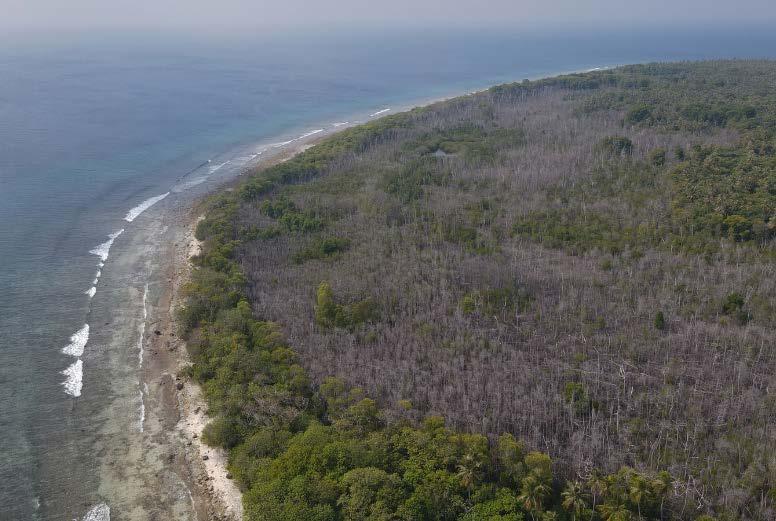
Pradeep Pathirana, Executive Sous Chef at Ayada Maldives, has established himself as a distinguished culinary professional in the Maldives’ luxury hospitality industry. His journey, spanning nearly two decades, reflects his dedication to honing his craft, his passion for creating memorable dining experiences, and his commitment to sustainability and team development.
Pradeep began his career in 2004, embarking on his culinary journey at an international hotel school in Kandy, Sri Lanka. Early on, he worked with experienced chefs and mentors who shaped his approach to the culinary arts. “I worked with good, experienced chefs, and I followed the guidelines and tasks they gave me. This foundation helped me build my career quickly,” he shares.
He started his professional journey at Jetwing Hotels, John Keells Hotels, and Swiss Hotels in Sri Lanka. These initial experiences gave him the opportunity to develop a solid understanding of the hospitality industry and culinary standards. In 2010, he moved to the Maldives, where he found a second home. “The Maldives is like my second home. I respect this culture, the small communities,
and the unique challenges of resort life,” says Pradeep, who declined opportunities in other countries to continue working in the Maldives. Over the years, he climbed the culinary ladder, working at renowned properties like Kanuhura Maldives, Coco Collection, Jumeirah Maldives, Sirru Fen Fushi Maldives, and Vakkaru Maldives before joining Ayada Maldives. His move to Ayada marked a significant turning point in his career, where he could truly push his culinary boundaries and share his vision with the world.
Pradeep credits his rapid rise to his disciplined work ethic and long-term planning. “Every two years, I got a promotion because I set monthly and long-term goals. I didn’t stay in one place until I achieved my targets,” he explains. His ambition and determination
Dining at Veligandu is about more than just the food—it’s about creating unforgettable memories.
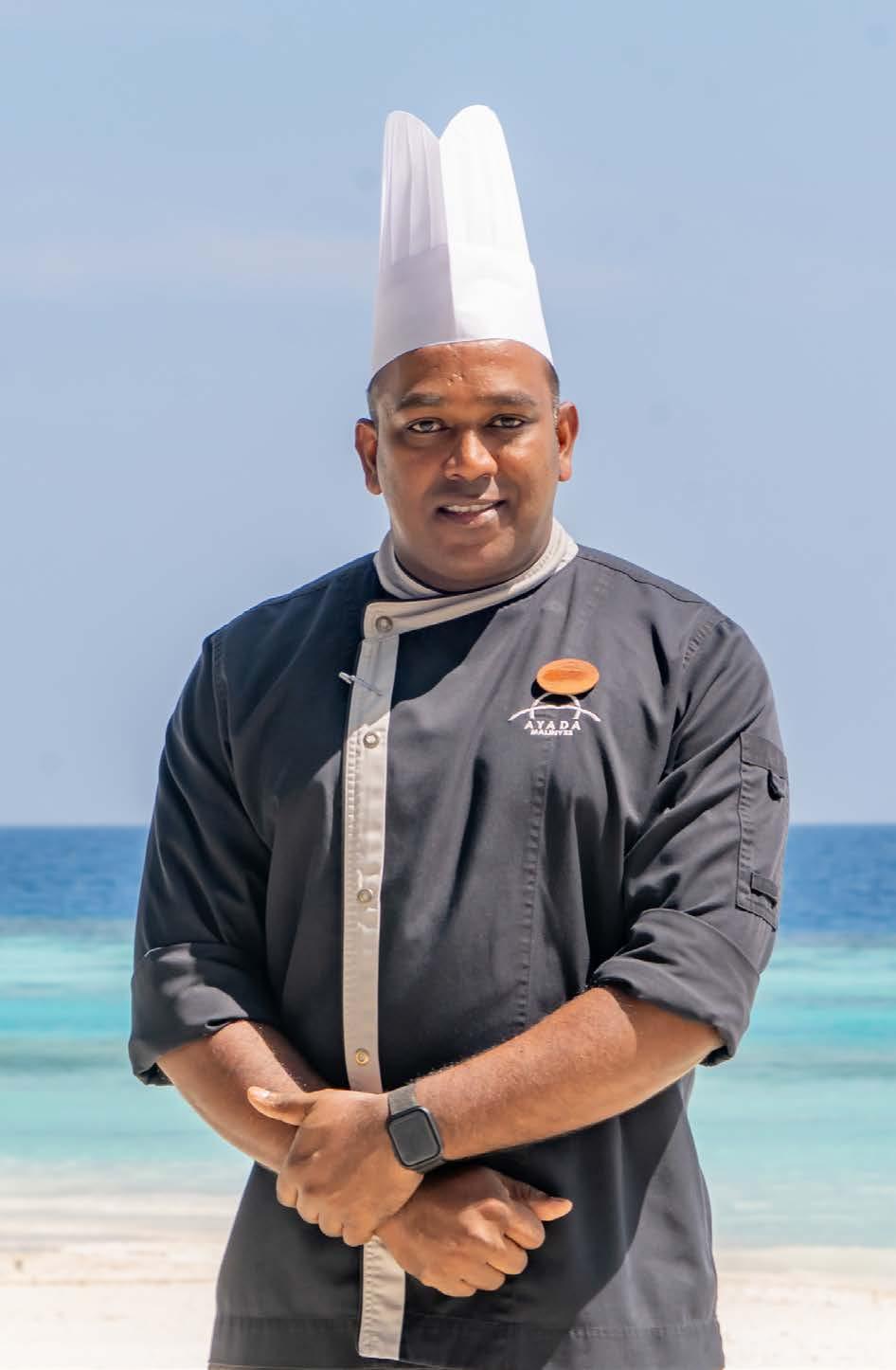
have been key to his success, as have the diverse experiences gained by working in various luxury resorts. These experiences equipped him with the knowledge and confidence to lead large teams and manage operations in world-class kitchens.
At Ayada Maldives, Pradeep leads a team of 49 kitchen staff across seven outlets. His role involves managing operations, ensuring food quality, and creating menus that cater to the discerning tastes of the resort’s international guests. “We do food testing before serving guests. When creating a new dish, we involve everyone, from chefs to owners, to refine it and ensure it meets the highest standards,” he says. This level of attention to detail and commitment to quality is central to the resort’s culinary philosophy, and Pradeep takes it upon himself to ensure that each dish is nothing short of exceptional.
Guest feedback plays a vital role in Pradeep’s process. “After every operation, one chef goes to each table to gather honest feedback. This helps us identify areas for improvement and ensures we deliver an exceptional dining experience,” he explains. This commitment to guest satisfaction has led to repeat visitors and rave reviews. The resort’s dining reputation continues to grow, not just because of the quality of the food but also due to the team’s proactive approach to service and continuous improvement.
One of the unique challenges of working in the Maldives is managing supplies, especially given the remote location of many resorts. Pradeep has
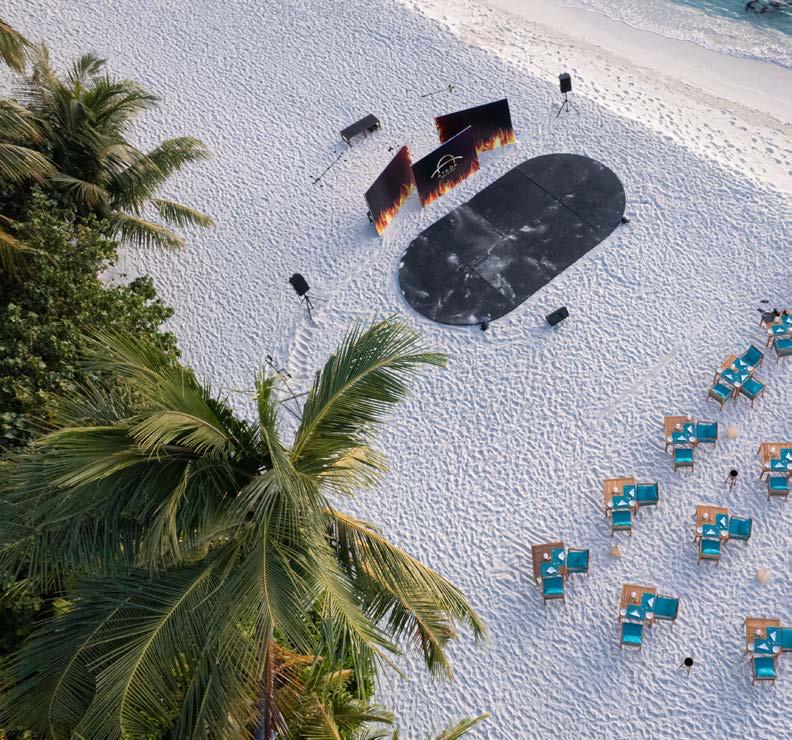
developed strong relationships with local suppliers, particularly fishermen, to source fresh, sustainable ingredients. “We give opportunities to local fishermen and farmers. We get very fresh fish directly from them, which enhances the taste and quality of our dishes,” he shares. This commitment to using local ingredients aligns with Ayada’s sustainability goals and allows the resort to support the local economy. The fresh, high-quality produce sourced directly from these local suppliers plays a crucial role in crafting the distinctive flavours that guests rave about.
Pradeep’s dedication to sustainability extends beyond sourcing. At Ayada, he champions environmentally friendly practices, such as reducing plastic use and
managing waste responsibly. “We segregate garbage, use compost machines, and ensure our chillers are well-maintained to minimise food waste,” he says. He also emphasises the importance of protecting the Maldives’ delicate ecosystem. “I remind my team daily to respect this country. Guests come here for its natural beauty, and it’s our responsibility to preserve it.” These practices have contributed to the resort’s efforts to lower its environmental impact, helping to safeguard the natural resources that make the Maldives a sought-after destination for travellers worldwide.
Staff development is another cornerstone of Pradeep’s leadership. He conducts daily, weekly, and monthly training sessions for his team, covering

We give opportunities to local fishermen and farmers. We get very fresh fish directly from them, which enhances the taste and quality of our dishes.
everything from basic cooking techniques to managing guest dietary requirements. “Training is essential. Without it, we can’t run a smooth operation. Every day, we train chefs to ensure they are equipped to handle challenges and deliver excellence,” he explains. By continually enhancing the skills of his team, Pradeep ensures that the kitchen runs efficiently and that the dining experience at Ayada remains top-notch.
Pradeep’s efforts to nurture young talent extend to opportunities outside the resort. Under his leadership, Ayada Maldives’ team participated in the prestigious Hotel Asia Culinary Challenge, earning nine medals, including two golds. “We trained hard and planned meticulously to bring fresh ingredients to Malé for the
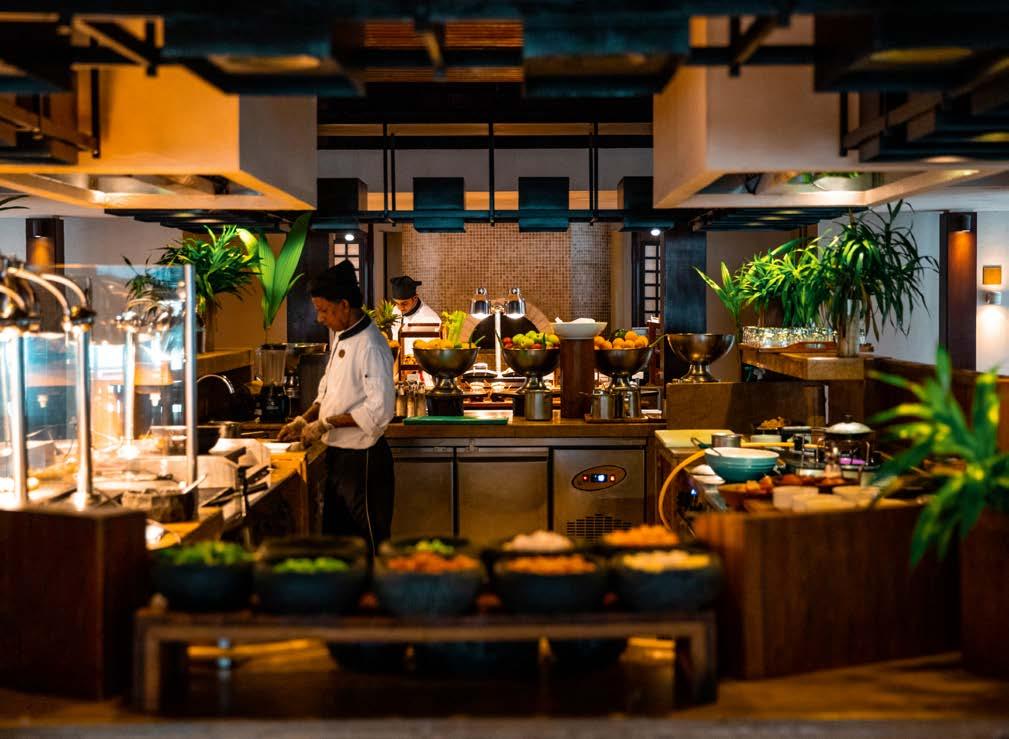
competition. It was the first time our young chefs participated, and they performed exceptionally well,” he proudly recounts. This achievement was a proud moment not only for Pradeep but also for his team, as it showcased their dedication, skills, and potential to excel on a global stage.
For Pradeep, every guest’s experience is an opportunity to innovate. He tailors dining experiences for long-stay guests to keep their meals exciting and personalised. “We don’t let guests get bored with the same menu. Our multinational team offers cuisines from around the world, and we are flexible in adapting dishes to their preferences,” he says. This approach ensures that guests leave with unforgettable memories of their stay, eager to return and experience new culinary delights on future visits. By offering personalised dining options, Pradeep adds a unique touch that helps Ayada Maldives stand out in a competitive hospitality market.
Pradeep is also deeply committed to his own growth. He recently
completed a master’s degree in business management, a testament to his belief in continuous learning. “I keep developing myself and learning new things. If I learn something, I share it with my team so we can all grow together,” he says. This dedication to self-improvement reflects his broader approach to leadership—helping others grow while simultaneously expanding his own knowledge base.
Pradeep is focused on elevating Ayada’s culinary offerings further. Menu engineering, guest feedback, and industry comparisons are central to his strategy. “We compare our dishes with those from other resorts and strive to create the best. If a dish isn’t popular, we replace it with something better. Our goal is to deliver high standards and unforgettable dining experiences,” he explains. This commitment to constant improvement ensures that Ayada Maldives remains a top choice for discerning travellers seeking a unique culinary experience.

We don’t let guests get bored with the same menu. Our multinational team offers cuisines from around the world, and we are flexible in adapting dishes to their preferences

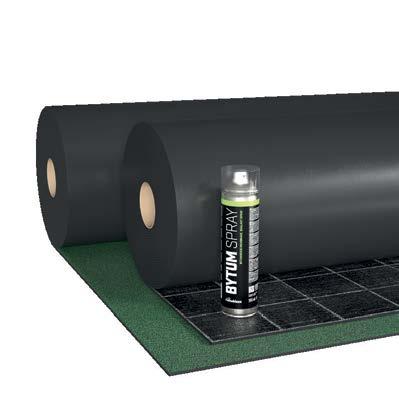
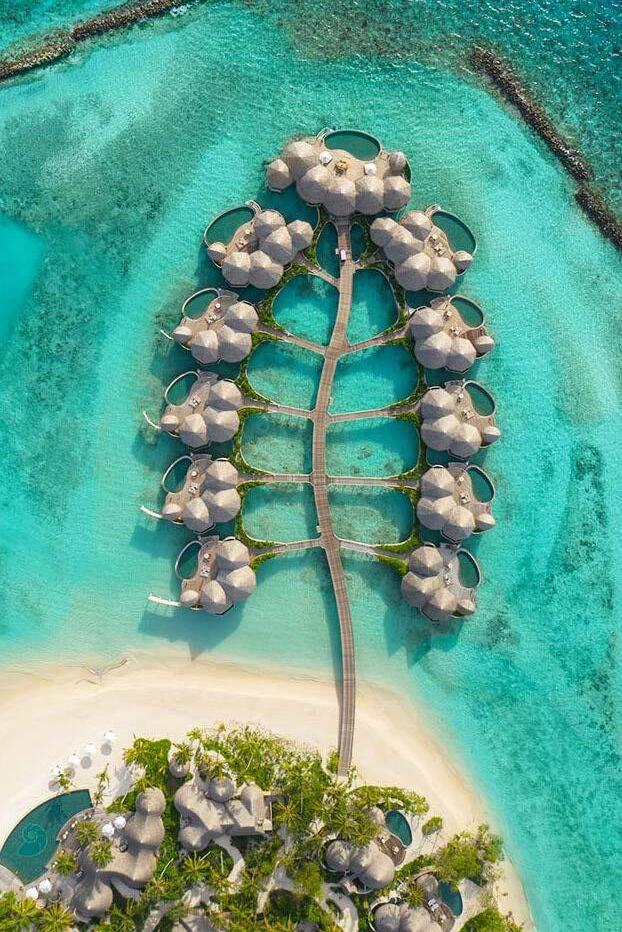
In the Maldives, where luxury resorts are set on isolated islands, meticulous maintenance plays a crucial role in ensuring a flawless guest experience. For the unsung heroes— maintenance managers and engineers—keeping operations smooth demands foresight, adaptability, and a proactive approach. This article delves into key strategies for effective maintenance management in this unique island environment.
Operating a resort on a secluded island presents logistical and environmental challenges. Spare parts and specialist technicians often need to be sourced from distant locations, resulting in longer response times and increased costs. Additionally, the harsh tropical
environment—characterized by salt-laden air, intense sunlight, and high humidity— accelerates the wear and tear of equipment, necessitating more frequent maintenance than in inland locations.
A resort’s infrastructure is diverse, encompassing villas, pools, restaurants, spas, power generation units, and desalination plants. This complexity requires a versatile maintenance team capable of handling a wide range of tasks or coordinating with specialized contractors to ensure swift issue resolution.
At the core of maintenance operations lies a steadfast commitment to guest comfort and safety. Promptly addressing maintenance concerns minimizes
disruptions and ensures guests enjoy a seamless experience.
Strategies for a Flawless Paradise
1. Preventive Maintenance: The Cornerstone of Success
A robust preventive maintenance (PM) program is essential for preventing unexpected equipment failures. Conduct routine inspections on all critical systems, from villa air conditioning units to pool filtration systems. Schedule regular cleaning, lubrication, and part replacements based on manufacturer guidelines and historical performance data. This proactive approach minimizes breakdowns, reduces repair costs, and enhances the guest experience.
Maintaining a well-stocked inventory of essential spare parts is vital for minimizing downtime. Use forecasting techniques to predict part requirements based on equipment usage patterns and seasonal demands. Establish partnerships with local suppliers to ensure quicker access to critical components, reducing delays in maintenance and repair tasks.
3.
Computerized Maintenance Management Systems (CMMS) streamline maintenance operations by automating work order scheduling, tracking inventory, and generating performance reports. By analyzing equipment trends and identifying potential issues, CMMS optimizes resource allocation and helps prioritize maintenance tasks, ensuring timely and efficient operations.
Continuous training equips maintenance staff with the skills needed to handle a wide range of equipment and systems. Cross-train team members to enhance their versatility and improve operational flexibility. A well-trained team can quickly and effectively address unexpected issues, ensuring the resort continues to operate smoothly.
Sustainability is a critical aspect of modern maintenance management. Invest in energyefficient equipment, implement water conservation initiatives, and prioritize waste reduction through recycling and responsible disposal practices. These efforts not only benefit the environment but also resonate with eco-conscious travelers, enhancing the resort’s reputation as a sustainable destination.
6.
Open communication with guests is essential, especially when maintenance activities might cause temporary inconveniences. Inform guests in advance of any planned maintenance and offer alternative arrangements where possible. Transparent communication fosters trust and ensures guests feel valued, even during unavoidable disruptions.
By implementing these strategies, resorts in the Maldives can ensure a seamless and memorable experience for guests. Proactive maintenance planning, resourceful problem-solving, a commitment to sustainability, and a welltrained team are the cornerstones of effective maintenance management—keeping paradise pristine and operations running smoothly in one of the world’s most idyllic destinations.

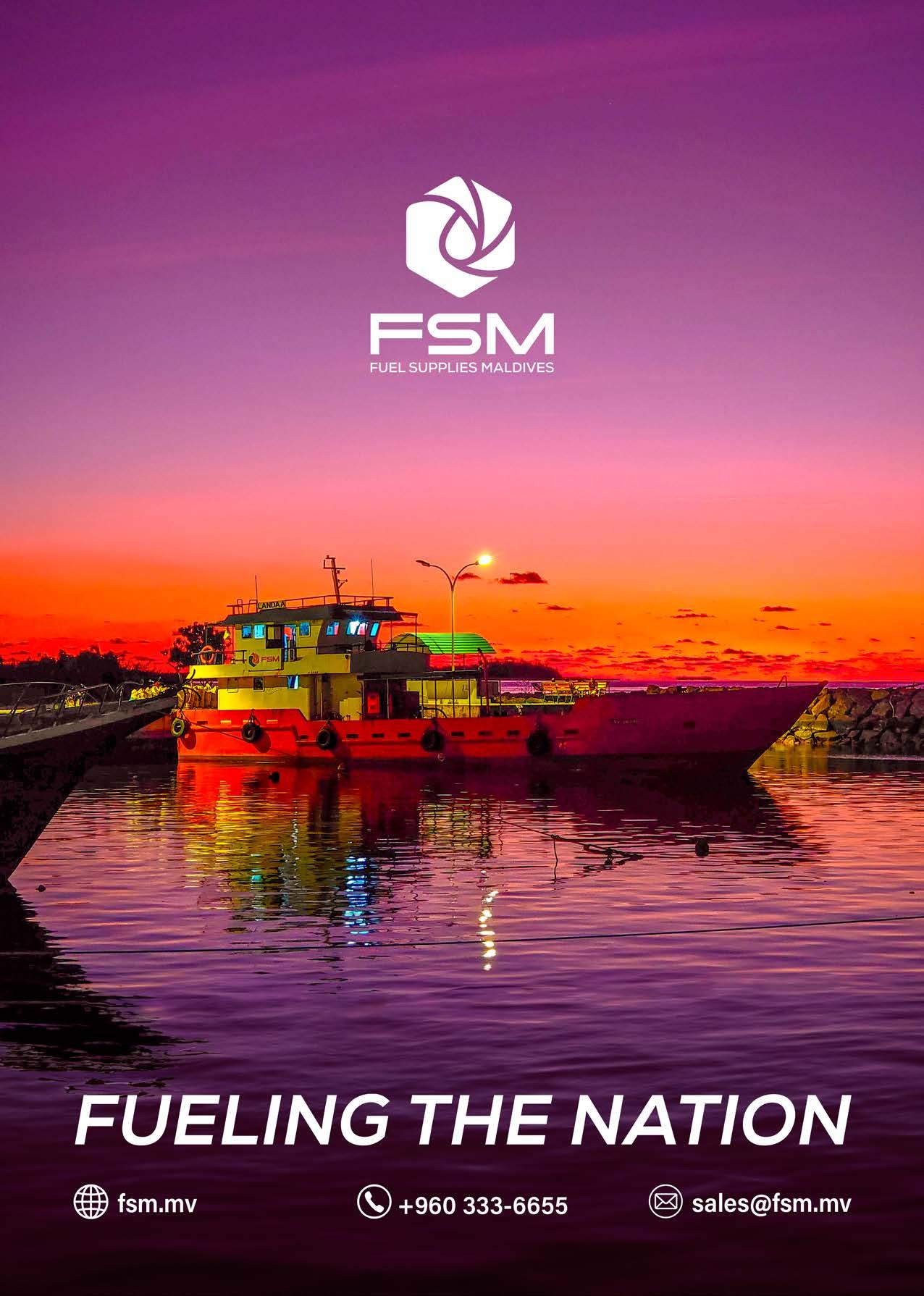
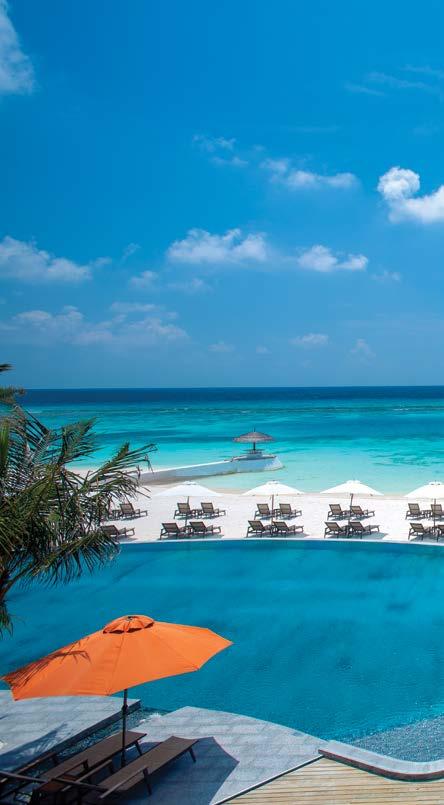
The Maldives is renowned for its breathtaking resorts and luxury tourism offerings, but it’s worth remembering that many of these iconic destinations started as uninhabited islands, devoid of infrastructure, facilities, or revenue generation. Hundreds of islands across the Maldives remain in this same undeveloped state today, contributing little to nothing to the state or public in terms of revenue. These islands represent untapped potential that could transform into revenue-generating assets, much like the resorts that now drive the nation’s economy.
From Untouched Islands to a Billion Dollar Industry
Public funds did not develop the current resorts, which generate billions of dollars annually for
the Maldives’ economy. Private investors took the financial risk, pouring resources into creating the world-class tourism assets we see today. They built the infrastructure, developed the services, and created employment opportunities that have turned the Maldives into a global tourism powerhouse.
Without this investment, these islands would likely still be unproductive, contributing nothing to the state coffers. Instead, through a range of taxes and fees, the private sector has transformed these islands into a sustainable revenue source for the government.
• Resort rent
• TGST (Tourism Goods and Services Tax)
• GST (Goods and Services Tax)
• Green tax
• Import duties
• Pension contributions
• Income tax
• Withholding tax (WHT)
• Visa fees and quota fees
• Licence fees
These contributions collectively fund a significant portion of the state’s revenue, enabling the government to provide services and infrastructure for the public’s benefit.
It’s a well-established fact that government-led efforts to develop and operate resorts in the Maldives have consistently fallen short of expectations. Despite receiving prime opportunities and significant resources, state-

owned enterprises (SOEs) such as MTDC, STO, MACL, and IASL have consistently failed to deliver successful resort operations.
On the other hand, private investors have demonstrated their capability to transform barren islands into thriving resorts, generating billions in revenue and establishing the Maldives as a global tourism leader.
It’s purely these SOEs led by political appointees who have no or very little experience in the field, and they fuelled again with corruption. This is why SOEs continuously keep failing in this field.
The taxes paid by investors are
not mere contributions—they are the public’s rightful share of the revenue generated by these private-sector initiatives. We intend to use this money
to fund essential services like education, healthcare, infrastructure, and social welfare. It is the government’s responsibility to allocate these funds effectively to improve the well-being of Maldivian citizens.
Investors, on the other hand, have a clear role: to develop assets, generate economic activity, and ensure returns on their investments. Investors are not required to directly finance public services or infrastructure. Although we welcome corporate social responsibility initiatives, the government bears the primary responsibility for providing education, healthcare, harbours, and roads.
There is a growing misconception that private investors should use their profits to directly fund public projects. This expectation ignores the economic structure in which the government collects taxes to serve the public interest. Shifting this responsibility to investors undermines the purpose of taxation and creates
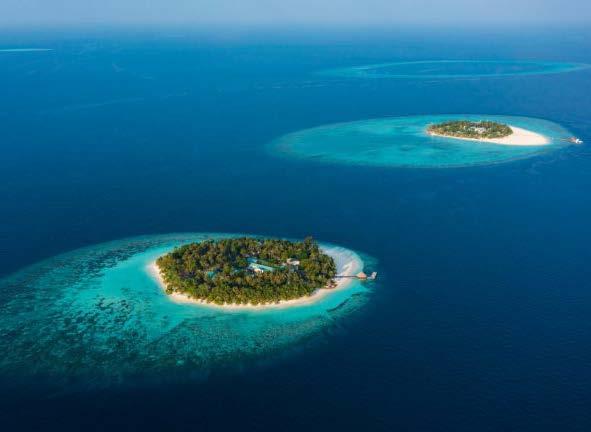
an unsustainable reliance on the private sector for public services.
Investors are already fulfilling their obligations by paying taxes and fees. Their focus must remain on ensuring the profitability and sustainability of their ventures, which in turn drives further economic growth and job creation. Asking them to do more diverts attention and resources away from their primary role, which could ultimately harm the broader economy.
The Maldives has a unique opportunity to unlock the potential of its remaining uninhabited islands by encouraging private investment. The right policies and incentives can transform these islands into valuable assets,
thereby contributing even more to the nation’s economy. However, the government must use the revenue from these investments wisely and transparently.
The state must prioritise spending tax revenue on public goods, such as:
• Improved healthcare facilities
• Quality education for all
• Robust infrastructure
• Affordable housing and social welfare programs
By doing so, the government can fulfil its mandate to improve the quality of life for Maldivians while allowing investors to focus on creating and maintaining the assets that drive economic growth.
The transformation of uninhabited

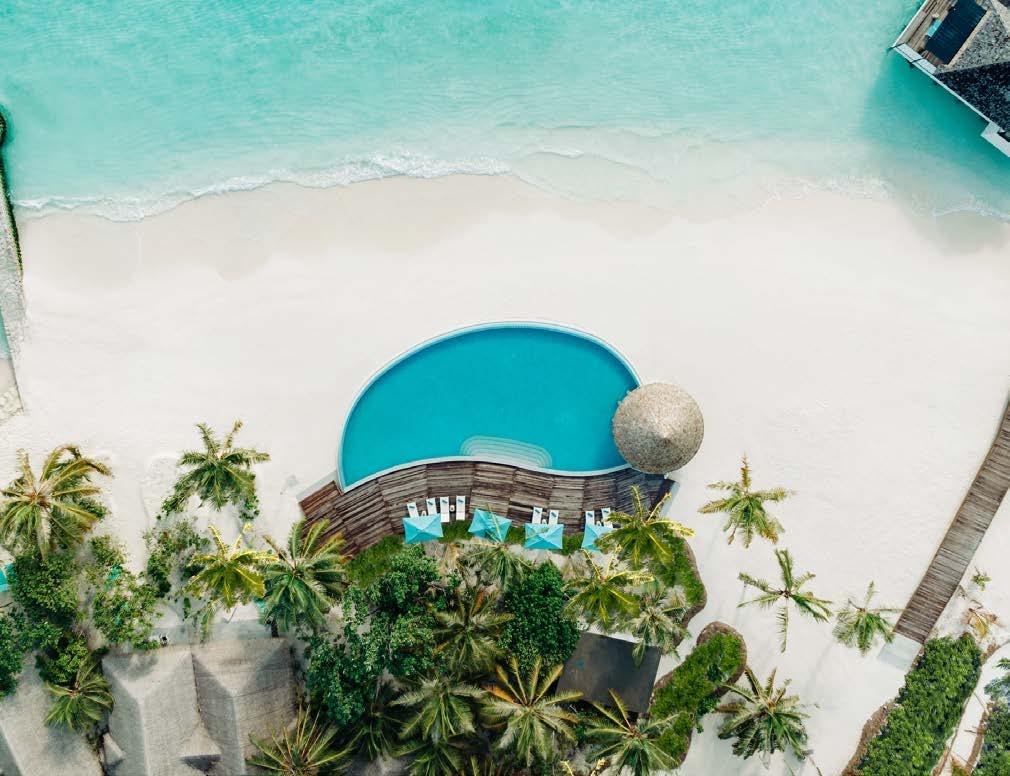
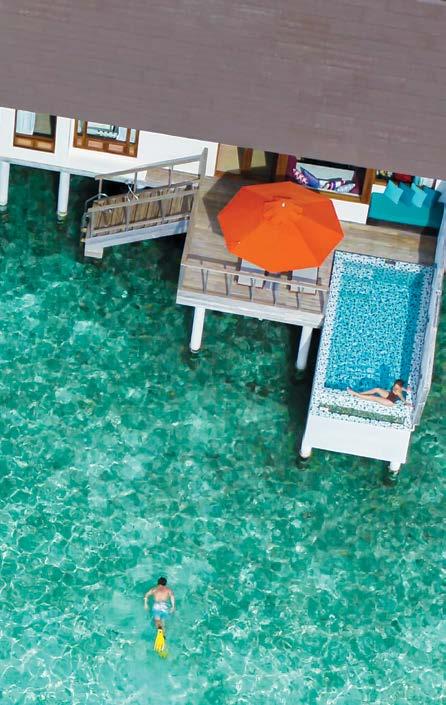
The right policies and incentives can transform these islands into valuable assets, thereby contributing even more to the nation’s economy.
islands into revenue-generating resorts is a testament to the vision and risk-taking of private investors. These investments have laid the foundation for the Maldives’ thriving tourism industry, generating billions in revenue and creating countless opportunities.
However, the government must use the taxes and fees generated to meet their needs. It is not the responsibility of investors to directly fund public services or infrastructure.
Recognising and respecting this distinction allows the Maldives to maintain its position as a global tourism leader, while also ensuring equitable benefits for its citizens from the wealth this remarkable industry generates.

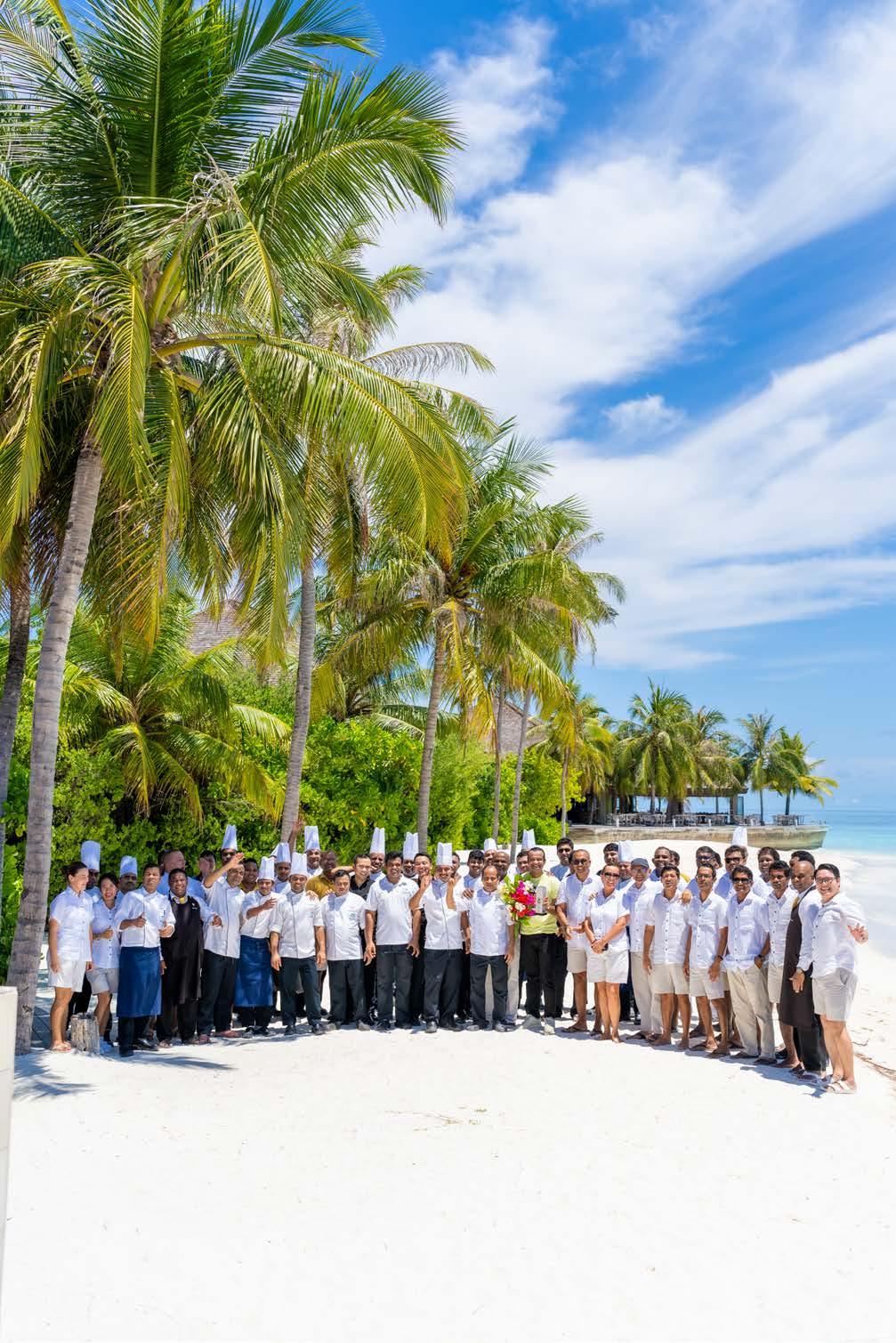
Last year’s theme of International Chefs Day, “Growing Great Chefs,” emphasised the importance of nurturing the next generation of culinary talent.
In the Maldives, where tourism is the backbone of the economy, chefs play a particularly crucial role in shaping the guest experience. From curating worldclass dishes in luxury resorts to promoting sustainability through innovative cuisine, chefs are at the heart of the Maldives’ thriving hospitality industry.
In the Maldives, where pristine beaches and turquoise waters are major attractions, food has become an integral part of the tourism experience. International guests seek not only the beauty of the islands but also unforgettable culinary adventures. Maldivian resorts, with their global clientele, must offer an array of gastronomic experiences—from European fine dining to authentic local flavours.
The chefs behind these creations are often the unsung heroes, crafting dishes that tell stories of the islands, their people, and the ocean that surrounds them.
Maldivian cuisine, with its blend of tropical ingredients, fresh seafood, and bold flavours, is gaining popularity among tourists. Dishes like mas-baiy, mas-huni, garudhiya, and fihunu-mas offer guests a taste of local tradition and culture. However, many resorts are unable to provide an authentic Maldivian culinary experience due to a shortage of local chefs in their teams. While international chefs bring global flavours, the true essence of Maldivian cuisine can only be fully captured by those who have grown up with these traditions.
The Maldives offers exciting career prospects for both aspiring and seasoned chefs. Resorts are constantly looking to enhance their culinary offerings, and there is increasing demand for chefs with diverse skills—from pastry specialists to sushi masters. For Maldivians, there is an untapped opportunity to fill the gap in local culinary representation and share their heritage with the world.
The demand for authentic Maldivian cuisine is growing, with many tourists seeking a deeper cultural connection through food. As more guests express interest in discovering local flavours, there is a clear opportunity for resorts to expand their menus to include more traditional dishes.
However, this can only be achieved if more local chefs are trained and integrated into resort kitchens.
Despite these opportunities, one of the significant challenges in the Maldivian culinary scene is the shortage of local chefs. While the hospitality sector employs many Maldivians, there remains a gap in the number of local chefs working in resorts compared to their international counterparts. This is due in part to a lack of formal culinary training opportunities within the country and the relatively new entry of Maldivians into professional kitchen roles.
To “grow great chefs” in the Maldives, it is essential to invest in education and training. Formal culinary schools and apprenticeship programs can offer
young Maldivians a path to develop their skills and take pride in a profession that has global appeal. International partnerships with culinary institutions, mentorship programs, and on-the-job training in resorts are critical in this regard.
Several resorts have already taken steps to address this gap by offering internships and training programs for local youth. These initiatives not only help young chefs acquire essential skills but also promote culinary careers as viable and prestigious options. For the tourism industry to continue thriving, there needs to be a concerted effort to elevate the profile of chefs in the Maldives and encourage more locals to pursue this path.
The increasing interest in Maldivian
The increasing interest in Maldivian cuisine provides a unique opportunity to blend tradition with modern innovation, and the local chef community can play a leading role in this culinary evolution.
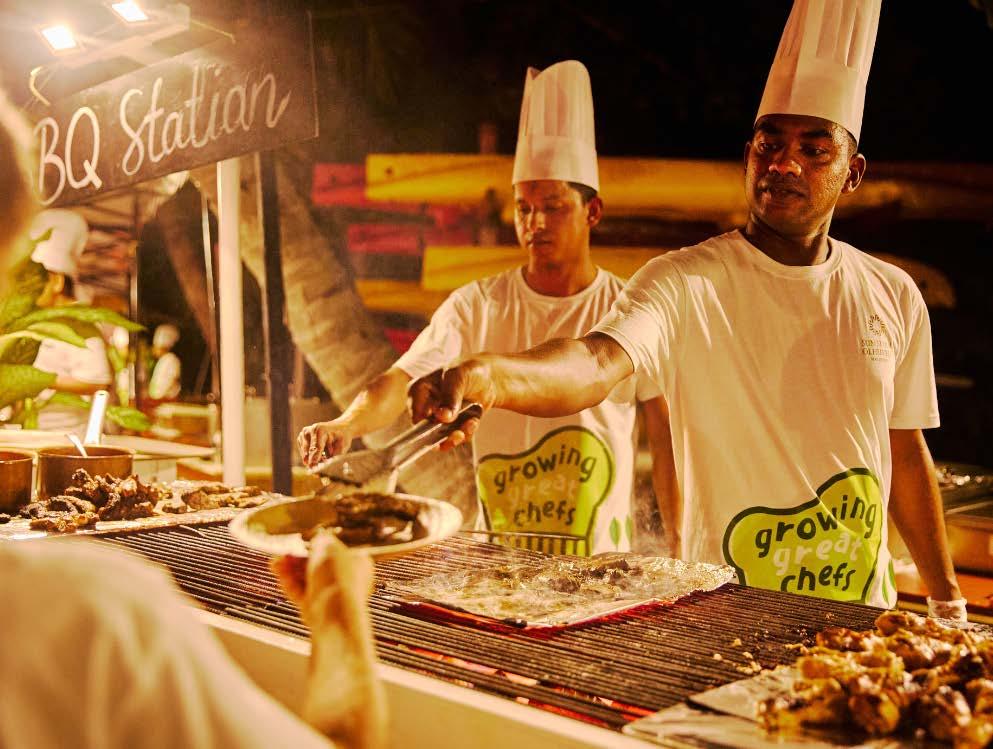


cuisine provides a unique opportunity to blend tradition with modern innovation, and the local chef community can play a leading role in this culinary evolution. The Maldivian government, resort operators, and educational institutions must collaborate to create a supportive environment where local chefs can flourish. Celebrations like International

Chefs Day serve as important reminders of the power of culinary arts to connect cultures, enhance the guest experience, and provide sustainable career paths for locals.
By focusing on “Growing Great Chefs,” the Maldives can ensure that its culinary offerings continue to evolve and attract discerning travellers from around the world.
As the Maldives solidifies its reputation as a premier luxury destination, the development of local culinary talent will be key to sustaining its growth. Chefs are not only creators of meals but also ambassadors of the Maldives’ unique culture and hospitality, and investing in their growth will yield benefits for generations to come.

In an age where exceptional service is often a key differentiator, there’s a story from the Maldives that embodies the essence of going above and beyond for customers, showcasing not only impeccable hospitality but also the Maldivian spirit of helping others. In a recent LinkedIn post, traveller Dominique D. shared his experience of how a seemingly minor technical issue could have turned his travel into a logistical nightmare—had it not been for the swift, empathetic
actions of Althaf Mohamed Ali, COO at Kandima Maldives.
Dominique and his family were on a seaplane, enjoying their vacation in the Maldives, when they encountered technical issues just ten minutes into their journey. With less than three hours before their international flight was scheduled to take off, they found themselves stranded on a nearby island, feeling the pressure of time slipping away.
Althaf Mohamed Ali
In an extraordinary twist, a “quiet, gentleman” sitting behind Dominique turned out to be Althaf Mohamed Ali. Without hesitation and before he even expressed concern, Ali was already taking action. In a move that exemplifies the highest standards of hospitality, he reached for his phone and began coordinating a plan to ensure Dominique and his family would make their flight.
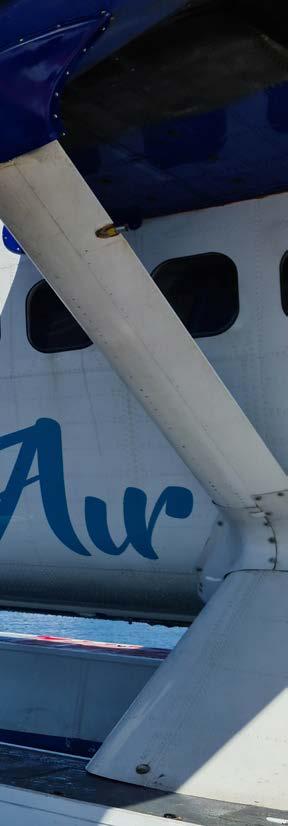
Ali’s approach was not only proactive but also deeply compassionate. With just their room number, he orchestrated an impressive array of logistics in record time. Within minutes, Ali had arranged a boat to a local domestic airport and informed the airline to hold the flight, ensuring the family could make their onward journey. Tickets were issued for the family before they even stepped onto the boat. Upon reaching the local airport, a seamless handover to the airline’s ground staff ensured that Dominique and his family were not only boarded immediately but had their Emirates flight seats held until the last possible moment.
In the following minutes, Manta Air coordinated further with Emirates, arranging Dominique’s bags and passports to be greeted on the runway, facilitating a smooth, swift check-in process. This coordinated teamwork between Kandima Maldives and Manta Air turned what could have been an immensely stressful day into a testament to the power of genuine customer care.
Ali later responded humbly on LinkedIn, emphasising the team effort behind the mission. “It was our duty to ensure you made it in time for the flight,” he wrote, expressing his appreciation for his colleagues’ dedication to exceptional service.
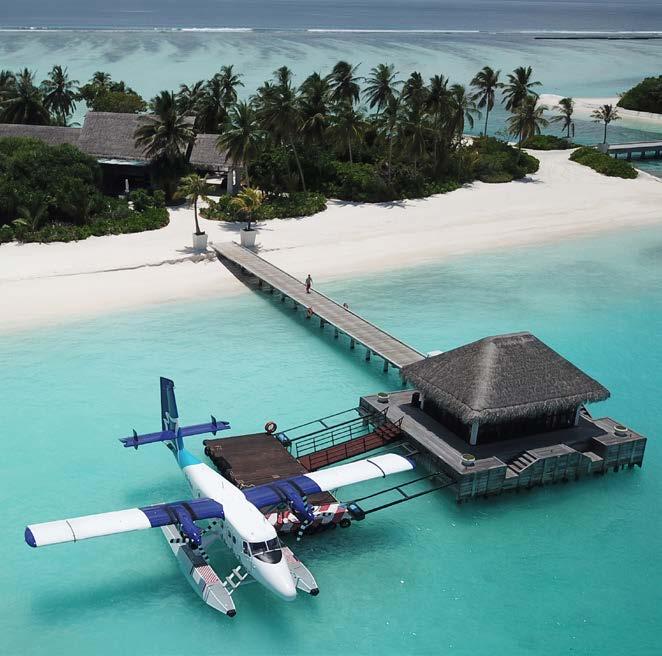
The heart of this experience is the dedication and initiative shown by Ali, alongside the teams at Kandima Maldives and Manta Air. In Dominique’s words, “many companies do customer service well,” but there’s a difference between doing what’s expected and going out of your way without needing to be asked. This episode is an inspiring reminder of how true hospitality extends beyond the call of duty, transforming potential setbacks into moments of genuine connection.
For the Maldivian tourism industry, Ali’s actions are a shining example of how the service culture in the Maldives can make travellers feel not only cared for but truly valued. This story is a tribute to how one individual’s kindness, combined with the support of a committed team, can indeed make the impossible possible.

Kandima Maldives is amplifying excitement with the debut of Fast Track, the Maldives’ first-ever professional-grade electric gokart track. Situated against the stunning backdrop of the Indian Ocean, this 500-metre track is the longest, fastest, and most thrilling karting experience in the region, designed for adrenaline enthusiasts and families alike.
Officially opened on November 15, 2024, Kandima continues to enhance its unique universal appeal by blending active and entertainment offerings, creating a premier holiday destination for all ages. Fast Track promises unforgettable memories, positioning itself as a top attraction for guests of all generations.



With speeds reaching up to 80 km/h, 12 exhilarating turns, and an environmentally friendly electric kart system, Fast Track offers more than just karting – it’s a highspeed adventure in paradise. As the Maldives’ first and longest asphalt track, Fast Track provides a 500-metre course packed with adventure, ensuring each lap is an extended thrill for racers.
Research¹ indicates that 2025 will mark the “year of collective adventure,” with studies showing that the desire for shared experiences is shaping travel behaviours. Now, more than ever, travellers worldwide seek experiences that can be enjoyed with others.
Kandima prioritises safety and
comfort with specially designed karts featuring adjustable seating, safety barriers, and full seat belts. Strategically positioned marshal posts along the track ensure racers can fully embrace the excitement with confidence. This attention to detail, paired with Kandima’s renowned service and innovative design, establishes Fast Track as an ultimate entertainment destination for anyone visiting the Maldives.
Whether seasoned racers or beginners, Fast Track offers various settings to ensure everyone has an exciting experience. Adjustable speed settings make the karts suitable for juniors, families, and thrillseekers alike. For those seeking a more immersive experience, Kandima offers Mini Grand Prix and
As the Maldives’ first and longest asphalt track, Fast Track provides a 500-metre course packed with adventure, ensuring each lap is an extended thrill for racers.
Grand Prix packages, including qualifying rounds, gridding, and a full race experience.
A full safety briefing is provided before each session, with a dedicated team offering expert guidance on kart handling, track navigation, and driving techniques, ensuring a thrilling yet safe ride from start to finish.
In line with Kandima’s commitment to sustainability, the karts are powered by advanced electric technology, providing an ecofriendly, zero-emission adventure. This high-tech, high-thrill experience aligns with Kandima’s environmental goals, allowing guests to enjoy the excitement of racing while preserving the island’s pristine beauty.

Fast Track combines Kandima’s signature style with breathtaking Indian Ocean views and a top-ofthe-line track, promising a unique racing experience. Guests can be among the first to hit the track and make lasting racing memories in this extraordinary location.
“At Kandima, we are always pushing the boundaries of what an island experience can be. We are thrilled to announce the launch of the Maldives’ longest and first oceanfront asphalt gokart circuit, specifically designed to cater to family travellers and adventure enthusiasts,” says Althaf Mohamed Ali, COO of Pulse Hotels & Resorts. “This exciting addition enhances our resort’s
We are committed to creating memorable and engaging activities that elevate the guest experience in our beautiful tropical setting.
Althaf Mohamed Ali, COO of Pulse Hotels & Resorts
offerings for all, providing an exhilarating experience for teens, couples, and families. We are committed to creating memorable and engaging activities that elevate the guest experience in our beautiful tropical setting.”
Further expanding its entertainment options, Kandima plans to launch “PlaySpace” in 2025, an immersive entertainment centre featuring classic arcade games, VR experiences, bowling, escape rooms, and more, appealing to teens, adults, and families alike. This addition reinforces Kandima’s reputation as the ultimate lifestyle destination for all travellers.

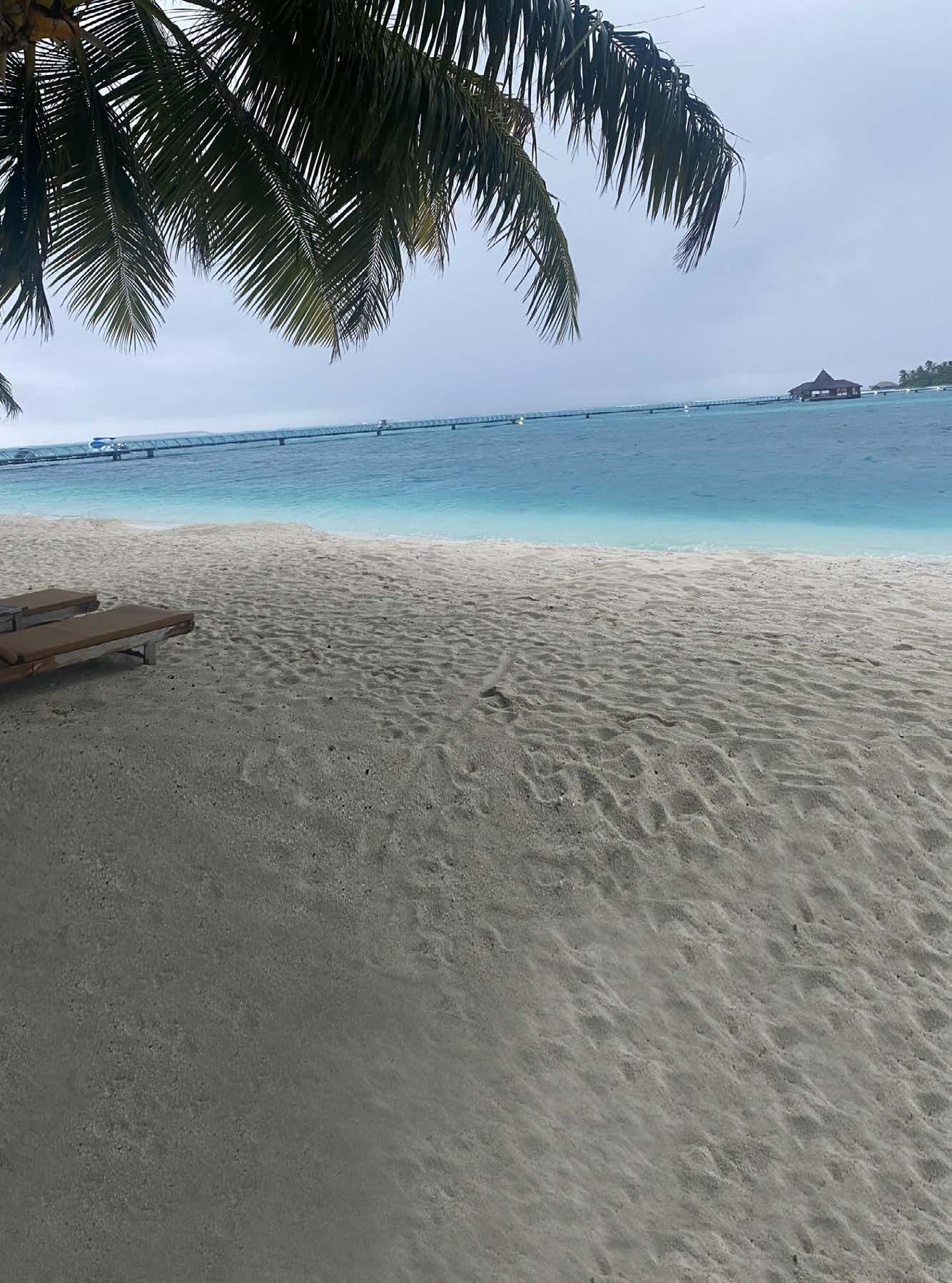





Ni Wayan Priyanka Diana, an ambitious and dedicated hospitality professional from Bali, Indonesia, is making her mark in the Maldivian hospitality industry as Assistant Sales Manager at Grand Park Kodhipparu, Maldives.
Ni Wayan Priyanka Diana, an ambitious and dedicated hospitality professional from Bali, Indonesia, is making her mark in the Maldivian hospitality industry as Assistant Sales Manager at Grand Park Kodhipparu, Maldives. Her journey from Bali’s vibrant tourism scene to the secluded islands of the Maldives offers insight into her passion for hospitality, her challenges, and the experiences that have shaped her career.
Priyanka’s love for hospitality began early, growing up in an environment deeply rooted in the industry. “Both my parents worked in hospitality,” she shares, “and being from Bali, where tourism is such a big part of life, I naturally gravitated towards it.” Her early exposure and curiosity led her to study hotel and tourism management in college, solidifying her path toward a career in hospitality.
Before joining Grand Park Kodhipparu Maldives, Priyanka spent seven years working in Bali, gaining invaluable experience in sales. In August 2023, she made the bold decision to relocate to the Maldives, seeking new challenges and opportunities in a different cultural setting. Reflecting on her move, she says, “Although Bali and the Maldives are both heavily focused on tourism, the experiences and the market dynamics are quite different. In the Maldives, I’ve learned so much—working in a multicultural environment and dealing with new clientele. It has been a fulfilling experience.”
One of the most significant differences Priyanka has noticed between her time in Bali and her current role in the Maldives is the multicultural nature of her workplace. “In Bali, I mostly worked with fellow Indonesians, but here, I’m working
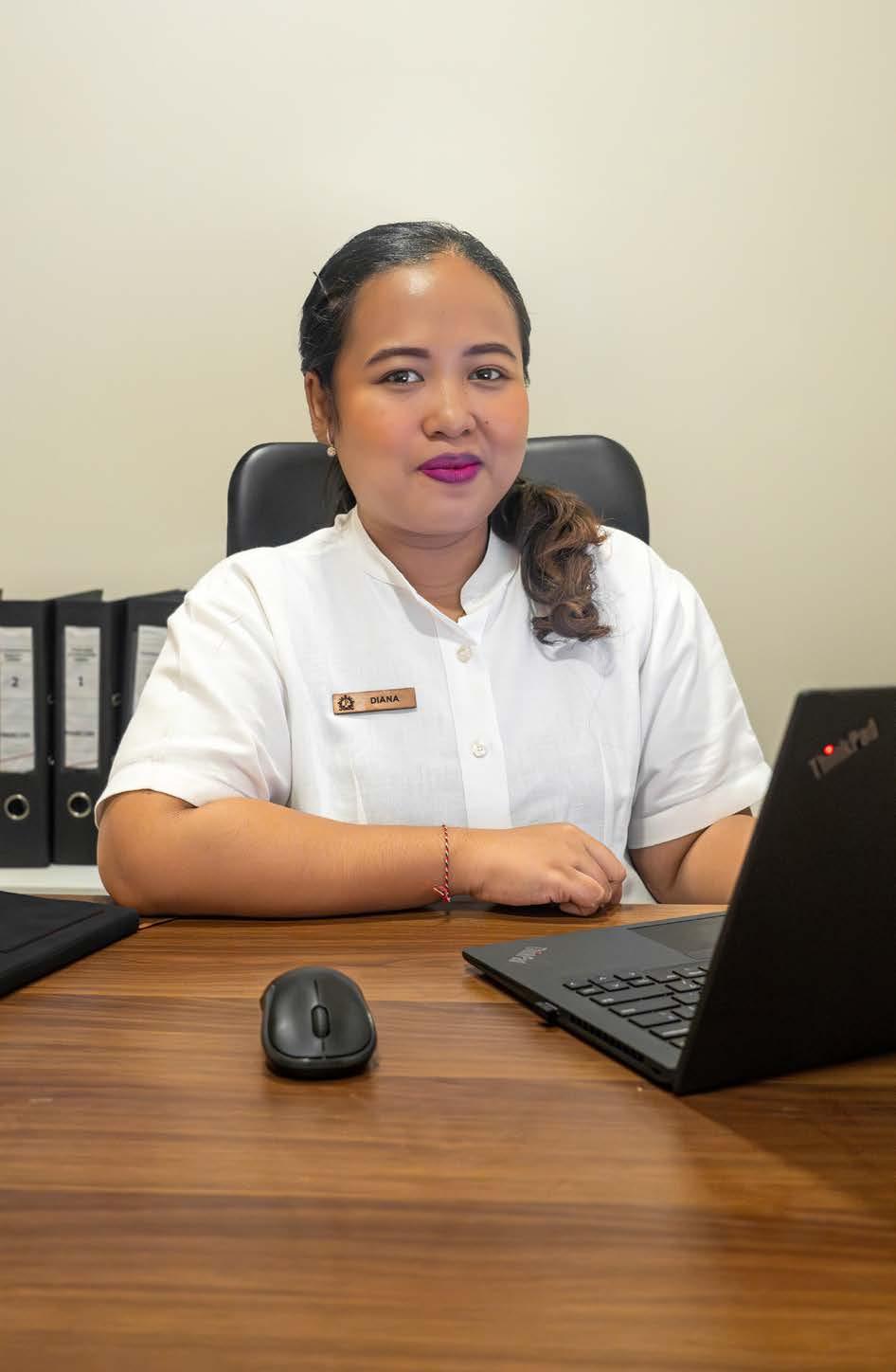
In the Maldives, I’ve learned so much— working in a multicultural environment and dealing with new clientele. It has been a fulfilling experience.
with people from all over the world—Sri Lankans, Indians, Maldivians, and more. It’s a melting pot of cultures, and that diversity has enriched both my professional and personal life.”
This exposure to different cultures has also been an essential part of Priyanka’s learning journey. She explains how this diversity has taught her to adjust her approach in sales to better cater to the preferences and working styles of her clients and colleagues. “Every culture has its own way of doing things, and understanding that helps me be more effective in building relationships.”
While the opportunities in the Maldives have been exciting, Priyanka acknowledges that her journey hasn’t been without challenges. “The biggest challenge for me was being far away from my family,” she admits. “It was difficult at first, feeling isolated on the island. But we have a ferry that regularly goes to Malé, and I’ve found ways
to create my own community here by connecting with friends from different resorts.”
She also mentions the professional challenges that come with the job, especially in a competitive market. “The Maldives is growing as a luxury destination, and with so many new resorts opening, the competition is fierce. We constantly have to think creatively about how to maintain our edge—whether through personalised guest experiences or strategic partnerships with travel agents.”
Priyanka’s approach to sales is grounded in building strong, lasting relationships. “Sales is all about human-to-human interaction,” she explains. “When you build trust with your clients, they are more likely to stay loyal to your property. I believe that close communication and connectivity are key—clients need to feel that personal touch.”
Her network of contacts is vast,

both in the Maldives and abroad. Priyanka keeps in touch with her peers across different resorts to stay informed about market trends. “We regularly chat, even if we can’t meet in person. We exchange insights on how our respective resorts are performing, and that helps me stay sharp and adaptive to market conditions.”
As for the future, Priyanka has her sights set on climbing the corporate ladder. “I’ve recently been promoted to Assistant Sales Manager, and my goal is to become a Sales Manager next. Who knows, in another five years, I might be a Director of Sales,” she says with a confident smile.
For young women considering a career in hospitality, Priyanka offers simple but powerful advice: “Be brave. Take risks. When opportunities present themselves, seize the moment and leap. You won’t know what’s out there until you experience it for yourself.”
She also emphasises the
I’ve
always been curious about working abroad, and coming to the Maldives was a dream. It’s not just about career growth, but personal growth as well.
importance of exploring beyond one’s comfort zone. “I’ve always been curious about working abroad, and coming to the Maldives was a dream. It’s not just about career growth, but personal growth as well. If you want to build a career in hospitality, it’s essential to embrace new experiences.”
From Bali to the Maldives, Ni Wayan Priyanka Diana has not only expanded her professional expertise but also cultivated a deeper understanding of different cultures and the intricacies of sales in a globalised world. As she continues to make her mark in the industry, her story serves as an inspiration for others to follow their passion, take on new challenges, and seize the opportunities that life presents.
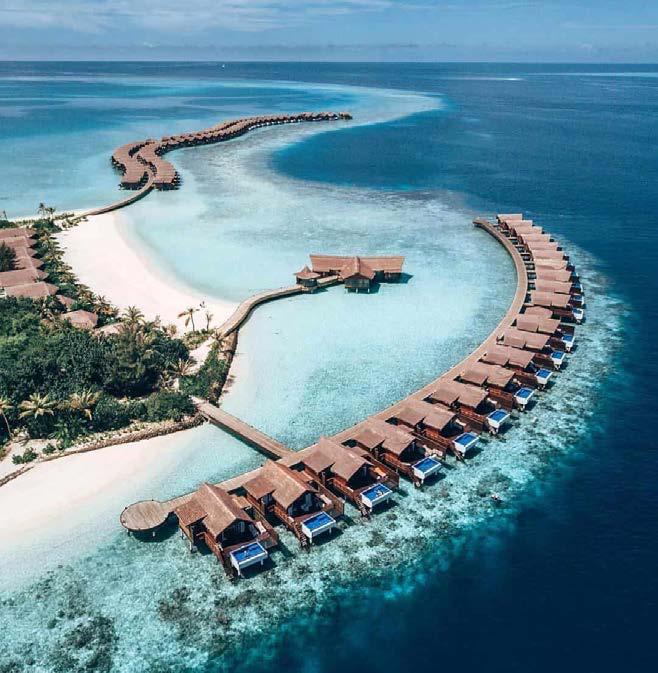



Hotelier Maldives is preparing to host the second edition of the Hotelier Maldives Awards, scheduled to take place in early May 2025.
Following the success of the inaugural event in April 2024, the upcoming awards will be even more impactful, with the addition of four new categories: Watersports, Diving, Airport Representative, and Resort Manager. These categories aim to celebrate an even broader range of professionals who contribute to the Maldives’ thriving tourism and hospitality industry.
Presented by BestBuy Maldives (BBM), the Hotelier Maldives Awards debuted in 2024 with overwhelming industry participation, receiving over
300 nominations and more than 100,000 votes from the public. The event has quickly established itself as a premier platform to recognise excellence and outstanding achievements within the hospitality sector.
Nominations for the 2025 edition officially opened on January 1, 2025. Hospitality stakeholders across the Maldives are encouraged to nominate deserving individuals in their teams who exemplify professionalism, dedication, and passion in their respective fields.
In addition to the newly introduced categories, the 2025 awards will continue to honour excellence across other key areas, providing a platform to spotlight the unsung heroes of the Maldives’ tourism industry.
Updates and detailed information on the nomination process are published on hoteliermaldives. com/awards and our social media.This is your chance to help shine a spotlight on the talent and commitment that define the Maldives’ worldclass hospitality sector.
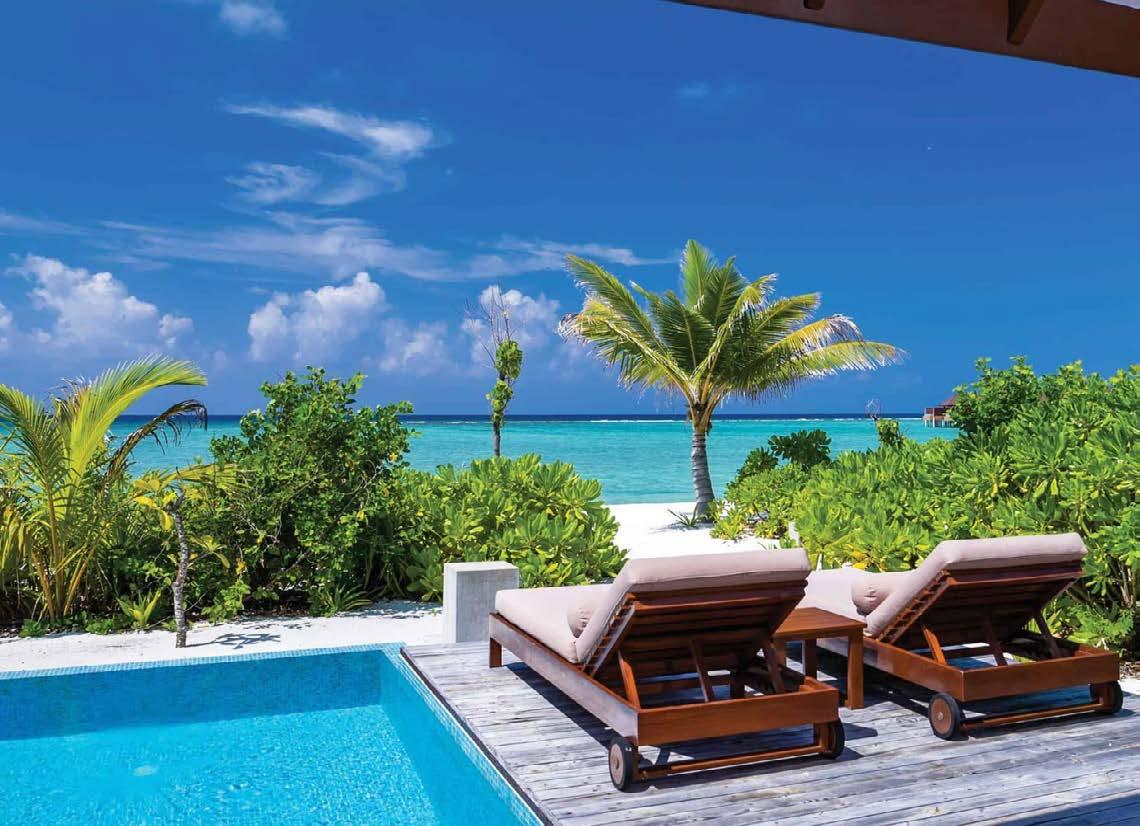
VARU by Atmosphere, an iconic private island resort in the Maldives, celebrated its five-year anniversary in November 2024, marking five years of hospitality, culture, and luxury inspired by the core philosophy of the Joy of Giving.
The Naturally Maldivian resort hosted key stakeholders, including the island’s owners, corporate leadership, and colleagues, for an evening of grand celebrations featuring cultural performances, awards, and diverse culinary experiences.
Since its opening in 2019, VARU by Atmosphere has established
itself as a sanctuary for travellers seeking to explore the Maldives’ rich cultural heritage while enjoying heartfelt hospitality. Guests at the resort experience the beauty of the turquoise lagoon and immerse themselves in the relaxed island lifestyle of this picturesque Indian Ocean destination. A standout feature of the resort is the award-winning
Kaagé restaurant, which highlights authentic Maldivian cuisine, celebrating local ingredients, flavours, and culinary traditions.
Reflecting on the milestone, Mei P. Pun, General Manager of VARU by Atmosphere, noted the significance of the resort’s name, saying, “In Dhivehi, the Maldivian dialect, VARU translates to living life



in abundance, strength, resilience, and above all, authenticity. For us, hospitality is about sharing the soul of the Maldives with every visitor, a mission made possible by the dedicated team. Their passion, warm smiles, and unwavering energy resonate with guests, many of whom return time and again.”
Part of the Atmosphere Hotels & Resorts brand, VARU by Atmosphere is a contemporary 5-star resort offering a luxurious island experience with 108 villas situated along white sandy beaches, crystal-clear turquoise lagoons, and three jetties featuring spacious overwater accommodations. Guests benefit from the exclusive VARU
Plan™, a comprehensive holiday package that includes diverse dining options, spa experiences, daily activities, and excursions designed to enrich their stay.
Situated on the North-West edge of Malé Atoll, the resort is easily accessible via a 40-minute speedboat ride from Velana International Airport. It boasts four restaurants and two bars, ensuring a wide range of culinary options, alongside premium facilities such as a dive school, water sports centre, overwater ELE|NA spa complex, gym, kids’ club, ocean excursions, and daily complimentary snorkelling trips to explore the vibrant underwater world.

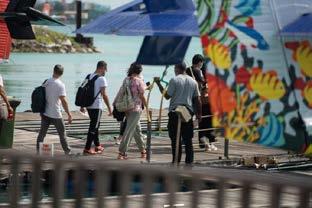
President Mohamed Muizzu has ratified amendments to several laws, leading to an increase in the fees charged for passengers departing from airports, a higher Tourism Goods and Services Tax (TGST), and a doubled green tax.
The amended laws include the Tourism Act, the Value Added Tax Act, and the Taxes and Fees on Passengers Departing from a Maldivian Airport Act.
Under the ratified amendments, TGST on tourism services will rise from 16% to 17%, effective July 2025.
Additionally, the departure tax and airport development fee has seen changes from December 1, 2024.
According to the amendments:
• The airport departure fee for foreign nationals in economy class rose from $30 to $50.
• The fee for business class passengers increased from $60 to $120.
• The fee for first class passengers increased from $90 to $240.
• The fee for jet passengers increased from $120 to $480.
However, the amendments will not alter the tax imposed on economy class passengers, which remains at $1 for both the departure tax and airport development fee.
The amendments to the Tourism Act also double the green tax. Starting in January 2025:
• The green tax for guesthouses with fewer than 50 rooms increased from $3 to $6.
• For resorts, city hotels, and other establishments with more than 50 rooms, the green tax increased from $6 to $12.
The government estimates that these changes will generate an additional MVR 3 billion in revenue, stemming from the increased TGST, green tax, and departure taxes on foreign travellers using Maldivian airports.
Airport Departure Fee
Economy Class passengers
$30 - $50
Business Class passengers
$60 - $120
First Class passengers
$90 - $240
Jet passengers
$120 - $480
Green Tax
Guesthouses with under 50 rooms
$3 - $6
Resorts, City Hotels etc with over 50 rooms
$60 - $120
In a significant move to address stalled resort development projects, Tourism Minister Ibrahim Faisal has sought the advice of Attorney General Ahmed Usham to cancel the agreements of 22 islands leased for resort development due to lack of progress.
During a parliamentary session in October, Faisal revealed that a total

Tourists visiting the Maldives are also subject to a ban on importing and using vaping devices, according to homeland security minister Ali Ihsan.
The government has announced a comprehensive prohibition on the import, use, and distribution of all types of vaping devices, which came into effect in late 2024.
Starting from November 15, the import of vaping equipment and its parts were banned. Following this, from December 15, the use, possession, manufacture, sale, advertising, and free distribution of vaping devices were prohibited.
In a press conference held at the President’s Office, Ihsan confirmed that the ban also applies to tourists entering the Maldives. Responding to questions from the press, Ihsan stated,
of 58 islands have been identified with minimal or no development progress. Some of these islands have remained idle for as long as 15, 20, and even 30 years. The Economic Council has prepared a comprehensive paper to engage with the entrepreneurs who have leased these islands, aiming to understand and address the obstacles hindering their development.
However, Faisal emphasised that for 22 of these islands, no development work has been carried out at all, prompting the need for legal advice from the Attorney General to proceed with the cancellation of the agreements. This step is seen as crucial to reclaiming these islands and potentially re-leasing
them to more proactive developers.
In the past, the government has faced legal challenges and demands for compensation from lessees when attempting to cancel such agreements. To mitigate these issues, amendments to the Tourism Act have been proposed and are expected to be submitted to the parliament soon.
Faisal’s initiative underscores the government’s commitment to ensuring that leased islands are developed in a timely manner, contributing to the Maldives’ tourism sector and overall economic growth.
“From November 15, if anyone enters the Maldives and attempts to bring vape devices, we will intercept them at the border.” He also clarified that from December 15, tourists were prohibited from using vape devices in the country.
When asked whether exceptions could be made for tourists, Ihsan said there are currently no plans to offer special provisions under the law.
“Other governments may decide to offer tourists special status, similar to the way alcohol is allowed in resorts. However, we have no intention of doing so at this time,” he added.
Ihsan addressed multiple questions regarding the government’s decision, highlighting concerns over the increasing use of vaping devices among youth. He mentioned that
vaping has been used as a method to introduce harmful substances to students, and incidents of bullying related to vaping have been reported.
Ihsan noted that there have been reports of students being forced to use vape devices by their peers, particularly in schools. He added that the Ministry of Education had confiscated thousands of vape devices from schools over the past year, underscoring the severity of the issue.
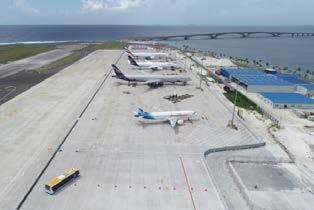
The Maldives announced a change in its regulations on tobacco and nicotine-containing products brought in by tourists.
On October 5, 2024, customs authorities removed previous duty concessions for these products, requiring all nicotine items to be declared at customs. The initial revision limited tourists to a maximum of 19 cigarettes, with any excess being confiscated to reduce tobacco imports and promote public health.
However, customs later issued a new circular, easing these limits. Under the revised guidelines, tourists may now bring up to 200 cigarettes.
The updated import rules are as follows:
• Tourists on a tourist visa can bring up to 200 cigarettes (or 10 packs).
• Alternatively, they may import 20 cigars or up to 250 grams of tobacco.
• Any quantity exceeding these limits will be seized by customs, with the items returned to tourists upon their departure from the Maldives.
These regulatory changes follow the recent discontinuation of duty concessions on tobacco, shisha, and e-cigarette products, which had been postponed twice before.
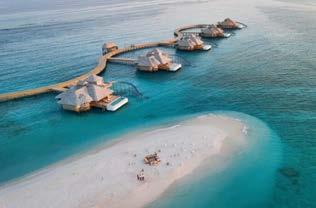
Tourism Minister Ibrahim Faisal has announced that the HDh. Hanimaadhoo International Airport, funded by India’s Exim Bank, is expected to facilitate the addition of 4,000 tourist beds in the surrounding region upon its completion.
Faisal shared this update during a parliamentary session in response to a question posed by MDP MP Hussein Ziyad. Ziyad had asked whether the government plans to increase the number of tourist beds in Haa Dhaalu Atoll following the completion of
the Hanimaadhoo airport project.
In his reply, Faisal confirmed that the ministry aims to develop around 4,000 beds in the area by the time the airport’s construction is finished, which is slated for completion in March 2025.
Faisal also provided updates on other tourism development efforts in the region:
• 15 hectares of land in Vikaramuraidu have been designated for tourism development.
• In February 2024, five islands in Haa Dhaalu Atoll were showcased to investors at the Investor Forum held in Dubai.
• Information about islands in Haa Dhaalu Atoll has been
Additionally, amendments to the Import Export Act, effective October 1, have raised the tax on imported cigarettes and hand-rolled bidi. Meanwhile, the Tobacco Control Act will be updated on October 15 to enforce a ban on importing vaping products and related components.
While the rules on tobacco products have become stricter, duty exemptions for personal goods brought by tourists have increased. Tourists can now import personal items worth up to MVR 10,000 duty-free under the ‘Duty Exemption on Goods Imported by Tourists, Small Useful Goods, and Business Samples’ regulation.
shared with investors at forums in Delhi and Mumbai.
• Additional investor forums are planned for Singapore, Dubai, Thailand, and India in 2025.
Currently, there are 460 registered tourist beds in the atoll. Additionally, three more islands have been allocated for tourism development, with ongoing projects expected to add 1,886 more beds.
At present, only two resorts are operational in the atoll: Soneva Secret Resort and Hondaafushi Island Resort. Faisal noted that while many islands in Haa Dhaalu Atoll had previously been earmarked for resort development, the government is now working to open more resorts to meet growing demand.
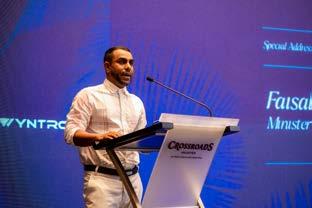
Tourism Minister Ibrahim Faisal has announced plans to reopen Shangri-La’s Villingili Resort, even if it requires amending current laws.
Faisal made this commitment in response to a question raised in parliament by Ibrahim Nazil, MP for Hithadhoo South.
“If changes to the law are necessary, the resort will be reopened,” Faisal stated.
Shangri-La Villingili Resort has been closed since 2020 due to the COVID-19 pandemic. The resort, which employed a large number of Maldivian workers, has now been shut for four years.
Faisal highlighted that reopening the resort is the most pressing issue for Addu’s tourism sector. He mentioned that he had already met with the resort’s management in his first month in office to address the situation.
“Our government has been working for many years, not just these past 10 months, to bring Shangri-La back into operation. The president
has promised to reopen the resort as soon as possible, and the Ministry of Tourism is actively working on that,” Faisal said.
The minister emphasised the government’s commitment to resolving the issue swiftly. He added that discussions with the resort’s owners are a priority and a team will soon be sent to expedite the process.
Under the current Tourism Act, there are no provisions to reclaim land leased for tourism development if the resort is built but not operational, provided rent is paid regularly. However, Faisal suggested that legal amendments might be introduced to help facilitate the resort’s reopening.
The government’s 30% stake in Addu Investments Pvt Ltd, the company that operates Shangri-La’s Villingili Resort, was relinquished during former President Ibrahim Mohammed Solih’s administration. Since then, no official statement has been made regarding efforts to restart the resort.
The resort spans 50.6 hectares and has a capacity of 284 beds.
Our government has been working for many years, not just these past 10 months, to bring Shangri-La back into operation. The president has promised to reopen the resort as soon as possible, and the Ministry of Tourism is actively working on that.
Ibrahim Faisal, Tourism Minister

Addu City celebrated a historic milestone with the global debut of its new tourism brand identity at the World Travel Market (WTM) 2025 in London. Organised in partnership with the Maldives Marketing and Public Relations Corporation (MMPRC) and the Addu Destination Management Office (ADMO), the event presented Addu City’s refreshed image as an essential travel destination, encapsulated by the tagline “Addu: Beyond the Equator.”
The launch, which marked the beginning of the Addu Tourism marketing initiative, was spearheaded by key figures, including the Mayor of Addu City, Ali Nizar; MMPRC Chairman, Abdulla Ghiyas; and MMPRC Managing Director, Ibrahim Shiuree. Each leader expressed Addu’s significant potential and shared a vision for its future as a captivating destination for global travellers.
This brand marks a pivotal point in Addu City’s tourism journey. Throughout WTM, ADMO engaged with international tour operators and travel agents, spotlighting the city’s unique attractions and diverse tourism offerings. The rebranding underscores Addu’s rich heritage, its pristine natural landscapes, and its unique appeal as a destination “Beyond the Equator.”
Choosing to launch Addu City’s tourism brand at the World Travel Market in London was strategically inspired by Addu’s colonial history, particularly its strong ties to Britain during World War II and afterward. Addu was a key site
for British forces, housing a Royal Air Force Base on Gan Island. This historical connection left an enduring legacy, with traces of British architecture, cultural influence, and shared memories still visible in Addu today.
Unveiling “Addu: Beyond the Equator” in London honours this historical bond and reflects the unique relationship between Addu and Britain. The launch positions Addu as a place where travellers can immerse themselves in both the scenic beauty and local culture of the Maldives, as well as in stories that span continents and generations. The debut at WTM London was more than a marketing opportunity; it invited the world, especially British visitors, to rediscover a place where their own history intersects with Addu’s unique heritage, evoking a sense of familiarity while exploring a distinct side of the Maldives.
Ali Nizar, Mayor of Addu City, underscored the event’s importance for Addu’s future, saying, “This moment is transformative for Addu City, as we step forward onto the world stage with a renewed sense of purpose and a brand that captures our unique spirit. ‘Addu: Beyond the Equator’ is a testament to our city’s history, culture, and natural beauty, inviting travellers to explore beyond the ordinary. Our aim is to share Addu’s remarkable heritage and landscapes, forging lasting connections with travellers worldwide. Addu will be a bucket-list destination for any tourists visiting the Maldives.”
MMPRC Chairman Abdulla Ghiyas highlighted the collaborative efforts behind the launch: “This new branding represents a powerful, unified vision for Addu City that aligns with our mission to promote the Maldives as a diverse and vibrant destination. Known now as ‘The Other Side of
Maldives,’ Addu has so much to offer—its unique location, rich culture, and breathtaking natural wonders all converge under this inspiring new identity. We’re proud to support Addu City in this journey and look forward to seeing the destination flourish.”
Ibrahim Shiury, MMPRC’s Managing Director, spoke on the future of tourism in Addu, stating, “Addu City’s new brand identity sets an exemplary standard for destination branding that aligns seamlessly with the Visit Maldives brand, encouraging more atolls and islands to follow this approach. Addu represents a new dimension of Maldivian tourism, inviting visitors to go beyond the usual tropical experience and discover a destination enriched by history, ecological diversity, and a vibrant community spirit. ‘Addu: Beyond the Equator’ brings a fresh perspective to our tourism narrative, and we are confident it will resonate with travellers seeking adventure, authenticity, and inspiration.”
This moment is transformative for Addu City, as we step forward onto the world stage with a renewed sense of purpose and a brand that captures our unique spirit.
Ali Nizar, Mayor of Addu City
President Mohamed Muizzu in December 2024 ratified the Foreign Exchange Bill, which introduces new regulations requiring foreign exchange earners in the tourism sector to exchange a portion of their foreign currency earnings to Maldivian rufiyaa.
Key provisions of the law include:
• Category A establishments (resorts): Resorts can either exchange $500 per tourist or 20% of their total revenue in foreign currency.
• Category B establishments (guesthouses, liveaboards, hotels): Guesthouses and other similar establishments have the option to exchange $25 per tourist or 20% of their foreign currency earnings.
• Other entities receiving significant foreign exchange: Businesses that earned at least $15 million in foreign currency over the past year must exchange 20% of their foreign exchange income.
The law includes an exemption for children under 12 years old from being counted as tourists in calculating retention obligations.
The finance committee made several changes, including provisions for concessions aimed at easing compliance. However, some stakeholders have raised concerns that the concessions may not apply uniformly across all types of resorts.
The law received written comments from four stakeholders:
• Maldives Association of Tourism and Travel Operators (MATATO)
• Maldives Monetary Authority (MMA)
• Kanifushi Investment
• Maldives Association of Tourism Industry (MATI)
MMA drafted the original bill to formalise new rules on foreign exchange transactions introduced last October 2024.
With MMA’s regulations in October, more than 50 resorts have informed the MMA that they do not intend to comply with the rule to exchange $500 per tourist exchange without any other option. Stakeholders have expressed concerns over the feasibility and fairness of the regulation’s provisions, particularly for different categories of resorts.

Category A
Resorts
$500 per tourist or 20% of revenue
Category B
Guesthouses, Liveaboards, Hotels
$500 per tourist or 20% of revenue
Other Entities
Businesses that earn at least $15 million
20%
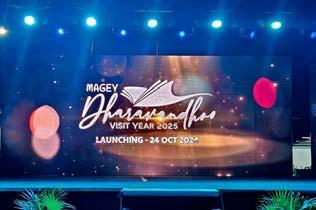
The highly anticipated Visit Dharavandhoo Year 2025 has officially been launched, marking the beginning of an exciting year dedicated to promoting the rich cultural heritage, natural beauty, and unique local experiences of Dharavandhoo Island. This campaign is part of a broader effort to boost local island tourism, offering travellers a chance to explore the Maldives beyond its luxury resorts.
The launch event was a vibrant celebration of local talent and culture. The function was graced with various performances from students, who showcased traditional music and dance, as well as cultural performances from the island’s youth. These lively presentations set the tone for the upcoming year, reflecting the energy and spirit of the Dharavandhoo community.
Located in the heart of Baa Atoll, a UNESCO Biosphere Reserve, Dharavandhoo Island offers an unparalleled experience for nature lovers, adventurers, and cultural enthusiasts alike. From world-class snorkelling at Hanifaru Bay, renowned for manta rays and whale sharks, to authentic Maldivian hospitality and culture, the island provides a gateway to an authentic local experience.
The year-long campaign will include workshops and seminars, an underwater coral park with Instagramworthy spots, the revival of cultural activities, a Futsal Fiesta, the Manta
Festival, a conservation project that will establish the foundation for a Manta Centre, cultural festivals, eco-tourism activities, and other collaborations with local businesses to highlight sustainable tourism practices.
Visitors will be invited to engage with the local community, explore marine life through guided tours, and enjoy immersive experiences such as Maldivian cooking classes, traditional music performances, and island hopping.
Speaking at the launch event, Sameeh Ali, President of Dharavandhoo Council, said, “Visit Dharavandhoo Year 2025 is a celebration of our island’s unique culture and biodiversity, combined with a focus on responsible tourism. We believe this campaign will attract travellers looking for unique experiences, supporting our local economy, and environment, laying a foundation for years to come.”
Dharavandhoo Island’s commitment to sustainability and communitydriven tourism ensures that visitors can enjoy the beauty of the Maldives while contributing to its preservation. As the campaign unfolds, more details will be shared across official channels, inviting both international and domestic travellers to be part of this special year.
Visit Dharavandhoo Year 2025 is a celebration of our island’s unique culture and biodiversity, combined with a focus on responsible tourism.
Sameeh Ali, President of Dharavandhoo Council

Dipti Katoch
Commercial Director Pullman
Maldives Maamutaa and Mercure Maldives Kooddoo
Pullman Maldives Maamutaa and Mercure Maldives
Kooddoo have announced the upcoming appointment of Dipti Katoch as their new Commercial Director, effective from October 21, 2024. With over 15 years of experience in revenue management and strategic market positioning at globally recognised brands, Katoch brings a wealth of expertise to the role. She will be responsible for overseeing revenue management, reservations, marketing, and sales strategies across both resorts. This holistic approach aims to create a cohesive strategy that enhances brand visibility, optimises bookings, and increases customer engagement.

Srikanth Devarapalli
General Manager at JW Marriott
Srikanth Devarapalli has been named General Manager of the luxury resort, leading the team in preparation for the launch of the second JW Marriott property and the eighth Marriott Bonvoy resort in the Maldives. Guests can look forward to an exceptional experience, featuring the Spa by JW and culinary offerings that showcase both local and international cuisine.

Ahmed Faris
Resort Manager at Villa Haven
Faris has garnered valuable experience working in renowned international destinations such as Indonesia, Thailand, Singapore, and Morocco. His career has been marked by a strong commitment to delivering exceptional guest services and maintaining operational excellence. Prior to joining Villa Haven, he served as Executive Assistant Manager at The Nautilus, a prestigious resort in the Maldives.

Sundar Raj
Director of Sales and Marketing at Ifuru Island Maldives
Raj joined the team in January 2024 as the Director of Sales, bringing over 15 years of industry experience to his new role. He began his career as a Banquet Manager with the Taj Group in India before transitioning into Sales and Marketing. Throughout his career, Raj has made significant contributions at organisations such as Reollo Travels, JW Marriott Maldives, and Amaya Kuda Rah. Originally from Mumbai, India, he values continuous learning and innovative ideas to foster team growth and elevate the property’s brand as an industry leader.

Marcel Sawyer
General Manager at Ifuru Island Maldives
A distinguished Swiss national with an 18-year career in luxury hotel management, Sawyer brings a wealth of expertise, innovation, and a strong commitment to guest satisfaction to his new role.

Laura Allevi
CSR Manager at Dusit Thani Maldives
In her new role, Laura will spearhead Dusit Thani Maldives’ commitment to sustainable practices across all operational aspects, including community outreach, environmental conservation, and educational initiatives. With a strong academic background and experience in sustainable tourism, she will play a crucial role in further embedding sustainability into the heart of the resort’s guest experiences and operations.



https://hoteliermaldives.com/awards/